#it is bad enough when those parties have to form a coalition to get any power. it does not have to get even worse
Text
One thing I haven't seen Dutch tumblrs talk about yet is how the new cabinet wants to change the way the voting system works, and fast. To be precise:
"Een wetsvoorstel tot invoering van een nieuw kiesstelsel voor de Tweede Kamer ter versterking van de regionale band tussen kiezers en gekozenen wordt dit jaar ingediend, gericht op tijdige inwerkingtreding voor de volgende verkiezingen"
Or in English:
"A bill introducing a new electoral system for the House of Representatives to strengthen the regional link between voters and elected officials will be introduced this year, aimed at coming into force in time for the next election."
Is it just me or does that sound like they want to institute a "winner take it all" system? Like saying, one candidate per district gets chosen, like in the UK (if I recall correctly)?
It sounds like they want to preserve their own power at the cost of democracy itself. Which party is behind this part and what are their intentions? A legal coup?
Like, this gets me scared. If last elections were bad for democracy, then a law change like that would basically put an end to it all together. Is it really a democracy if only two or three parties can get seats?
#non sims#rl stuff#dutch politics#politics#european politics#netherlands#nederland#if this goes through we would probably be stuck with pvv or vvd MAJORITY governments.#it is bad enough when those parties have to form a coalition to get any power. it does not have to get even worse#i do not want to see what a 75+ seats vvd would do to this country#waarom blog ik in het engels over de nederlandse politiek
10 notes
·
View notes
Text
AFTER FOURTEEN YEARS, EVERYTHING IS BROKEN.
5th July 2024
For the last fourteen years, the Tory government just gone has been the worst in living memory. I say that with the relative luxury of someone who has lived in the south east of England all their life; I imagine those living in the de-industrialised parts of the country who suffered and witnessed the devastation of their communities from the destructive economics of Thatcher may think differently. That in part would explain the discontent that was exploited during the campaign to leave the European Union. But never before have I witnessed the wholesale deterioration of the country by a political party motivated by their self-interest and self-entitlement.
David Cameron became leader of the Conservative Party after their third electoral defeat in 2005. His philosophy for twenty-first century conservatism and desire to become Prime Minister was predicated on his personal belief that he would be “quite good at it”. This breezy sense of self-belief and Etonian self-entitlement embodied the vacuity of the Conservative programme for the nation. Cameron, superficially centrist in his disposition, appealed to an electorate tired of a Labour government that had lost direction. But after thirteen years in opposition, it would appear that Twenty-first Century Conservatism offered nothing more than disingenuous expressions of concern for the environment and inequality. The electorate were not wholly convinced as the 2010 election delivered a minority Tory administration that relied on the Liberal Democrats with whom to form a coalition government.
The Tory-dominated government then exploited the banking failure of 2008 to inflict a devastating form of neo-classical economics upon the nation. The policy of Austerity was promoted by the false allegory of paying-off the nation’s “credit card” and predicated on the lie that the previous Labour government was profligate with public expenditure. As a percentage of GDP, the average annual public expenditure under Labour was less than that of the Thatcher/Major years. But David Cameron, along with his fellow Etonian George Osborne as his chancellor, portrayed the UK’s post-crash debt as an existential threat, when in reality it was proportionally less than the debt maintained in the 1960s.
Austerity has been a disaster that we still live with today. The NHS was already suffering with underinvestment before the pandemic, with waiting lists worse than they were when the Tories came to power. UK schools have suffered similarly, with staff shortages and cuts to the capital budget to a point where roofs are collapsing. Half of the country’s councils are now facing bankruptcy. This on top of closed libraries, community centres and early intervention programmes and dire underinvestment in the nation’s infrastructure means it will take years to recover.
But such recovery has further challenges. Because, Cameron’s self-belief blinded him to his own inability to lead. To get to be leader, he felt he needed to appease the extremists in his party. This started as a promise to take the UK out of the Centre-Right coalition in the European Parliament. This immediately lost us influence within the EU, which then allowed the extremist europhobes to cultivate a further sense of grievance; casting the EU as a federal state with undue control of our affairs.
Then, in January 2013, his inability to lead inspired him to appease the extremists further by committing to a referendum on EU membership. In 2015, his unexpected attainment of a Tory majority in the General Election of that year meant he was committed to hold the referendum the following year, which he lost. It was bad enough such a referendum normalised the unviable sham of leaving the European Union to appear to be a reasonable proposition, helped by the media giving it false equivalence, but we also had the unedifying spectacle of the mendacity of those who harboured personal ambition beyond any consideration for the country’s fortunes. Cameron’s sense of entitlement had facilitated that of another Etonian; Boris Johnson.
What followed was exploitation of the discontent generated by the Cameron and Osborne’s needless austerity, by the far-right reactionaries that populated the Parliamentary backbenches; keen to seize the agenda to promote petty prejudices. Boris Johnson was not one those, but was happy to adopt this agenda to further one particular cause: himself. Along with Michael Gove, who similarly harboured personal ambitions incompatible with the interests of the nation, they promoted every deceit and extremist position as an act of liberation and prosperity.
I can’t help recalling the unctuous mendacity of Michael Gove when he appeared to earnestly state the case, seemingly with all conviction, that leaving the European Union would give us “Control” over “Our Laws”, “Our Money” and “Our Borders”. We already had control over all three. Any international treaty requires “Our Laws” to include it - EU laws constituted,or were cited by, less than 15% of our legislation. “Our Money” was paid to maintain our EU membership, but cost 0.4% of our GDP. NATO, by comparison, costs 2% of GDP, and leaving the EU’s Single Market has cost 4%. Lastly, “Our Borders” are overseen by the UK’s Border Force. Referring to them in the way Gove did was simply a rabble-rousing conflation between EU’s Freedom of Movement policy and illegal migration. In fact, EU membership provided greater control of our borders, since we were members of Europol with access to live criminal intelligence and we could expedite extraditions with the European Arrest Warrant.
How Gove’s faux sincerity was replaced on the morning of 24th June 2016 by the look of remorse, on his and Johnson’s faces, as they came to terms with the fact that their self-serving political campaign had been too successful. 37% of the electorate had voted leave against 35% who wanted to remain.
What has followed is a period where Cameron resigned, rather than take responsibility, and Theresa May as successor continued to appease the extremists by her determination to leave the EU by exiting every EU institution. Labour, in opposition, had Jeremy Corbyn as leader; a deluded lefty whose preoccupation with his pet projects has facilitated the worst excesses of the Tories in power by supporting Brexit. Ostensibly, he promoted the Remain campaign, but his non-existent dedication to it played its part, as did his insouciant response to the parliamentary upheavals that followed.
An unnecessary election in 2017 saw May lose the Tory majority and the extremists she tried to appease lost patience. Boris Johnson took over, and his sociopathic disregard to truth and service facilitated the promotion of talentless reactionaries to government. Another election in 2019 saw a further intake of talentless reactionaries for the government benches, following a campaign that promised the false prospectus of getting “Brexit Done”. This gave us a “bare-bones” trade deal that would cost the UK a 15% drop in our EU trade, to add to our self-imposed exclusion from the European Medicines Agency, Europol, and many other beneficial institutions. All this would take effect in 2021, a year into the Covid pandemic, with the obvious objective of hiding the economic damage from their Brexit deal, with that of the pandemic. The effects of Brexit will dog our future prosperity for years to come. Finally, Johnson’s lying would see him ousted ignominiously following many scandals, most notably “Party Gate”.
Then Liz Truss took over. The Queen died the day after meeting her. How symbolic. Truss’s non-Midas touch initiated a policy inspired by corporately funded right wing fundamentalist “think tanks”. As a result, Truss managed to punch a £40 Billion hole in government finances via unfunded tax cuts for the rich. This prompted the Bank of England to issue more money for quantitative easing and for banks to raise interest rates when the bond markets went into meltdown. Pathologically lacking any self-awareness, Truss blamed the “woke establishment”. Sensing terminal decline, what remained of the Parliamentary Tory Party’s instincts for self-preservation leapt into life for one last time to replace her after just 54 days.
Rishi Sunak, was then selected by the parliamentary party (without the constituency party having a vote). Here was a man lacking the skill set for public service, having been a hedge manager profiting from the pound’s collapse during the 2008 banking failure. As chancellor, he made the poor poorer, funded a dining scheme to further spread the pandemic, and failed to fund education; neither to help students with their pandemic-affected education, nor to improve school buildings. School roofs, literally, started to collapse, along with his political prospects. No Tory leader could prevent their electoral decline, but many commentators soon drew the conclusion that he was just “no good at politics”. Given the far-right reactionaries populating the Tory benches, he, like his predecessors, appeased them with acts of performative cruelty to refugees and threats to leave international human rights treaties.
How did this happen? The aftermath of Labour’s 1997 landslide electoral victory was the time for the Conservative Party to consider their purpose and Conservative philosophy. Labour governed for Thirteen years. The soul-searching for the Tories in that period was a time to recognise the limits to Thatcher’s Free Market Fundamentalism and its dire effects on society. Instead such introspection seemed to be little more than Theresa May’s bewildered epiphany that the Tories were considered by some as “The Nasty Party”. Theresa May, as Home Secretary eight years later, would be the one to instigate a “Hostile Environment” to anyone that wasn’t considered by her to be indigenous to the UK. This culminated, amongst other things, in the Windrush Scandal that would victimise British citizens on the basis of their heritage and skin colour. It’s hard to understand what commitment to self-awareness took place when the Nasty Party emerged intact in the prevailing years from their re-election in 2010.
Everything is broken. The plight of the NHS, education, social services and even defence, is accompanied by a general malaise in our public institutions since UK Public Investment is substantially below the OECD average. And it’s not only councils that face bankruptcy - so too are water companies that are currently pumping sewage into our rivers. The fact the debts of the water sector are equivalent to the dividends paid to their shareholders over the years since privatisation illustrates how subservient the nation state is to corporations after four decades of neoliberalism.
However, the last fourteen years alone have shown how the interests of the Tory party were put before those of the nation. The desires of the extremist minority were appeased, particularly after Brexit, to the point where it became the majority in their midst. The simple solutions they offered for complex problems meant that, when said problems were exacerbated by their own ideology, they had to find new enemies; refugees, the judiciary, and anyone expressing concern for social issues. Ultimately their neoconservative agenda of free market fundamentalism and xenophobia has failed. The only thing they had left was to blame an imaginary Liberal “Deep State”; in doing so, they attempted to undermine the legitimacy of the democratic nation state and enable a fascistic plutocracy.
Keir Starmer has stated a need to return the government to “service”. To state that the Government is an institution of public service is a truism, but the fact that needed saying demonstrates how far the political discourse has degenerated in the country. Wish Labour luck, we need them to succeed, not only for our prosperity, but to quell the rising nationalism generated by the ineptitude of the self-serving charlatans we’ve just got rid of.
0 notes
Text
So I finally finished the much-recommended Book "the 100 years war on Palestine" by one Mr. Al-Khalidi.
Some observations:
First, the book is rightfully recced & pretty interesting. The author is very educated & has alot of insider knowledge due to his background. I would enjoy hearing this guy talk about the history of his country & his family's experience with it over 7 generations even if nothing particularly bad or exceptional had happened to the country
One interesting thing he points out is that in the 60s and 70s some miscalculations happened due to how ppl in the middle east were used to dealing with monarchies or warlord dictators. If you want your way in those systems the thing to do is to personally appeal to powerful ppl or get your guys close to their ears, so ppl mistakenly assumed the win condition was to get some powerful american to listen to you - He says they should've tried to sway public opinion in US & Israel instead
Big Palestinian factions have been asking for an unitarian democratic state since 68'!! this is striking bc so many ppl in the west believe the "neither side wants peace or compromise" carnard.... even educated/intelligent ones... Which is probably why the Zionists invested so much $ in propaganda, there's no honest, non-racist argument against equal rights.
His analysis is basically that agreeing to the 2 state solution was a mistake & that Arafat missed a huge opportunity to not only press for equality, but do so at a time when it was possible with peaceful means during the window of time when the ghandi trap may still have worked. The 1st intifada built up a lot of political/moral capital similar to what brought down past unequal regimes but instead of pulling a Ghandi/MLK and demanding full equality they got snared in unequal treaties (he attributes this to the PLO being mostly made up of ppl that fled the country & operated in neighboring arab states, so they weren't familiar enough with the reality on the ground in Palestine proper)
Over here we often discuss resistance in terms of violent vs. nonviolent but he puts more emphasis on what kind & what's right in which circumstance. He's not against armed resistance per se but for example decries the suicide bombings as blind revenge that mostly had counterproductive effects.
At one point Israel assassinated a moderate Hamas member who was vocally against suicide bondings. Rly lampshades how they want a bogeyman to fearmonger against, not security...
He singles out 2006 as the point where Hamas did an u-turn from straight up fundamentalism to a slogan of "reform & change" (interestingly, they even won some Christian neighborhoods, ppl were just fed up with the PLO's quisling behavior at that point) - though he's overall critical of them & found their actions up to 2017 non-useful squabbly infighting. Wonder what he'd say of later initiatives.
(Reminds me of how the CDU in Germany (centrist/moderate conservatives) had a bunch of muslim representatives despite the 'c' standing for 'christian' - cause they liked the benefits for traditional families & that it had "a place for religion" unlike other parties. That was during Merkel's day tho, nowadays the leadership has some idiots spouting borderline neo-colonial BS so I dunno if any muslims still feel like voting for them. prolly not. )
interestingly the two big parties/factions were initially willing to form a coalition government but Israel & the US torpedoed it, cue civil war in gaza...
0 notes
Note
If you don’t mind me asking, what’s going on with German elections? Most of the chatter on tumblr is, obviously, in German, and my German is not sophisticated enough to understand most of it
We voted for our parliament today! And it feels especially stressful this time. I'm gonna try to give a short summary.
We currently have 6 parties in parliament. Two of them are traditionally the biggest and usually, the one that gets the most votes will form a coalition with one or more of the others to form a government. The party with the most votes usually appoints the chancellor, the most powerful person in the country (the president is more of a figurehead). These are the parties:
CDU: Center-conservative. Angela Merkel is stepping down and they have a huge problem finding a replacement and having any kind of platform at all beyond "leftists bad". Also the usual conservative problems of financial scandals and right-wingers. Their candidate for chancellor (Laschet) is an both an ass and an incompetent clown.
SPD: Center-left. Social democrats. Traditionally strong among union workers. Their candidate for chancellor (Scholz) is pretty conservative for the party, and despite some financial scandals under his responsibility, general public perception of him is that he's like a fairly reliable normal politician which people crave in These Unprecedented Times.
Grüne: Green party. Slightly left of SPD. Has never been this big before, politics focused on the environment but good positions on social issues too. Their candidate for chancellor (Baerbock) has some flaws and also she's a woman and surprisingly, even after 16 years of Merkel, that's a noticeable disadvantage.
FDP: Economic liberals. The market will regulate itself!
Linke: Left party. Good on social stuff, incompetent on international politics, baggage bc of their historical connection to the GDR (which was bad).
AfD: Neonazis who pretend they're just Concerned Citizens.
Now!
According to the current projections, the social democrats got just sliiiightly more votes than the conservatives. Green party third strongest, but they were hoping for more. Liberals and Neonazis about the same. Left party will only get into parliament on a technicality. Basically I and many others were hoping for more, like maybe some more of those leftists the conservatives were so concerned about 👀
And now we all have to wait on the final results and THEN wait on who forms a coalition. This will be ROUGH bc it seems the liberals will have to be involved and they loooooove being important and blocking teamwork.
I hope that's comprehensive! I should have known when I started writing this that I would never be able to keep it short.
#germany#talking#tried to keep it fair but obviously these are my opinions and some of these points are subjective
1K notes
·
View notes
Link
In a democracy, every vote is supposed to be equal. If about half the country supports one side and half the country supports another, you may expect major institutions to either be equally divided, or to try to stay politically neutral.
This is not what we find. If it takes a position on the hot button social issues around which our politics revolve, almost every major institution in America that is not explicitly conservative leans left. In a country where Republicans get around half the votes or something close to that in every election, why should this be the case?
This post started as an investigation into Woke Capital, one of the most important developments in the last decade or so of American politics. Although big business pressuring politicians is not new (the NFL moved the Super Bowl from Arizona over MLK day), the scope of the issues on which corporations feel the need to weigh in is certainly expanding, now including LGBT issues, abortion laws, voting rights, kneeling during the national anthem, and gun control.
…
As I started to research the topic, however, I realized there wasn’t much to explain. Asking why corporations are woke is like asking why Hispanics tend to have two arms, or why the Houston Rockets have increased their number of 3-point shots taken over the last few decades. All humans tend to have two arms, and all NBA teams shoot more 3-pointers than in the past, so focusing on one subset of the population that has the same characteristics as all others in the group misses the point.
I think one reason Woke Capital is getting so much attention is because we expect business to be more right-leaning, and corporations throwing in with the party of more taxes and regulation strikes us as odd. We are used to schools, non-profits, mainline religions, etc. taking liberal positions and feel like business should be different. But business is just being assimilated into a larger trend.
Corporations are woke, meaning left wing on social issues relative to the general population, because institutions are woke. So the question becomes why are institutions woke?
…
Through the lens of ordinal utility, in which people simply rank what they want to happen, we are about equal. I prefer Republicans to Democrats, while you have the opposite preference. But when we think in terms of cardinal utility – in layman’s terms, how bad people want something to happen – it’s no contest. You are going to be much more influential than me. Most people are relatively indifferent to politics and see it as a small part of their lives, yet a small percentage of the population takes it very seriously and makes it part of its identity. Those people will tend to punch above their weight in influence, and institutions will be more responsive to them.
Elections are a measure of ordinal preferences. As long as you care enough to vote, it doesn’t matter how much you care about the election outcome, as everyone’s voice is the same. But for everything else – who speaks up in a board meeting about whether a corporation should take a political position, who protests against a company taking a position one side or the other finds offensive, etc. – cardinal utility maters a lot. Only a small minority of the public ever bothers to try to influence a corporation, school, or non-profit to reflect certain values, whether from the inside or out.
In an evenly divided country, if one side simply cares more, it’s going to exert a disproportionate influence on all institutions, and be more likely to see its preferences enacted in the time between elections when most people aren’t paying much attention.
…
Here are two graphs that have been getting a lot of attention

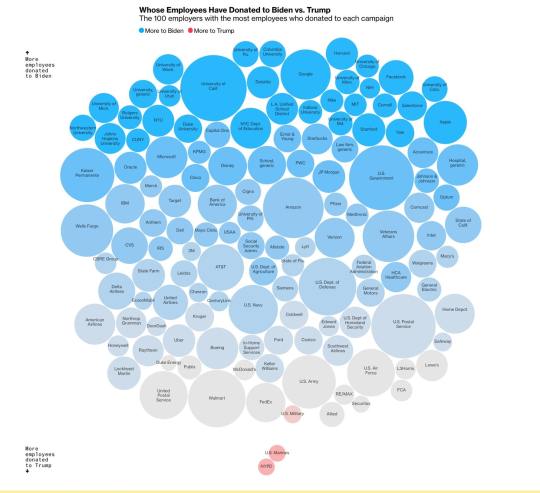
What jumps out to me in these figures is not only how left leaning large institutions are, but how the same is true for most professions. Whether you are looking by institution or by individuals, there are more donations to Biden than Trump. Yet Republicans get close to half the votes! Where are the Trump supporters? What these graphs reveal is a larger story, in which more people give to liberal causes and candidates than to conservative ones, even if Americans are about equally divided in which party they support (and no, this isn’t the result of liberals being wealthier, the connections between income and ideology or party are pretty weak). Here are some graphs from late October showing Biden having more individual donors than Trump in every battleground state.
…
In the 2012 election, Obama raised $234 million from small individual contributors, compared to $80 million for Romney, while also winning among large contributors.
…
In September 2009, at the height of the Tea Party movement, conservatives held the “Taxpayer March on Washington,” which drew something like 60,000-70,000 people, leading one newspaper to call it “the largest conservative protest ever to storm the Capitol.” Since that time, the annual anti-abortion March for Life rally in Washington has drawn massive crowds, with estimates for some years ranging widely from low six figures to mid-to-high six figures. March for Life is not to be confused with “March for Our Lives,” a pro-gun control rally that activists claim saw 800,000 people turn out in 2018. All these events were dwarfed by the Women’s March in opposition to Trump, which drew by one estimate “between 3,267,134 and 5,246,670 people in the United States (our best guess is 4,157,894). That translates into 1 percent to 1.6 percent of the U.S. population of 318,900,000 people (our best guess is 1.3 percent).” Even if the two left-wing academics who did this research are letting their bias infuse their work, there is no question that protesting is generally a left-wing activity, as conservatives themselves realize.
People who engage in protesting care more about politics than people who donate money, and people who donate money care more than people who simply vote. Imagine a pyramid with voters at the bottom and full-time activists on top, and as you move up the pyramid it gets much narrower and more left-wing. Multiple strands of evidence indicate this would basically be an accurate representation of society.
Another line of evidence showing that the left simply cares more about politics comes from Noah Carl, who has put together data showing liberals are in their personal lives more intolerant of conservatives than vice versa across numerous dimensions in the US and the UK. Those on the left are more likely to block someone on social media over their views, be upset if their child marries someone from the other side, and find it hard to be friends with or date someone they disagree with politically. Here are two graphs demonstrating the general point.
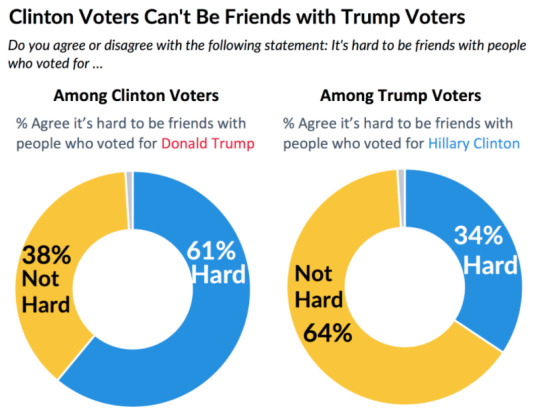

…
There’s a great irony here. Conservatives tend to be more skeptical of pure democracy, and believe in individuals coming together and forming civil society organizations away from government. Yet conservatives are extremely bad at gaining or maintaining control of institutions relative to liberals. It’s not because they are poorer or the party of the working class – again, I can’t stress enough how little economics predicts people’s political preferences – but because they are the party of those who simply care less about the future of their country.
Debates over voting rights make the opposite assumption, as conservatives tend to want more restrictions on voting, and liberals fewer, with National Review explicitly arguing against a purer form of democracy. Conservatives may be right that liberals are less likely to care enough to do basic things like bring a photo ID and correctly fill out a ballot. If this is true, Republicans are the party of people who care enough to vote when doing so is made slightly more difficult but not enough to do anything else, while Democrats are the party of both the most active and least active citizens. Yet while being the “care only enough to vote” party might be adequate for winning elections, the future belongs to those at the tail end of the distribution who really want to change the world.
The discussion here makes it hard to suggest reforms for conservatives. Do you want to give government more power over corporations? None of the regulators will be on your side. Leave corporations alone? Then you leave power to Woke Capital, though it must to a certain extent be disciplined and limited by the preferences of consumers. Start your own institutions? Good luck staffing them with competent people for normal NGO or media salaries, and if you’re not careful they’ll be captured by your enemies anyway, hence Conquest’s Second Law. And the media will be there every step of the way to declare any of your attempts at taking power to be pure fascism, and brush aside any resistance to your schemes as righteous anger, up to and including rioting and acts of violence.
…
From this perspective we might want to consider this passage from Scott Alexander, who writes the following in his review of a biography of Turkish president Recep Tayyip Erdogan.
The normal course of politics is various coalitions of elites and populace, each drawing from their own power bases. A normal political party, like a normal anything else, has elite leaders, analysts, propagandists, and managers, plus populace foot soldiers. Then there's an election, and sometimes our elites get in, and sometimes your elites get in, but getting a political party that's against the elites is really hard and usually the sort of thing that gets claimed rather than accomplished, because elites naturally rise to the top of everything.
But sometimes political parties can run on an explicitly anti-elite platform. In theory this sounds good - nobody wants to be elitist. In practice, this gets really nasty quickly. Democracy is a pure numbers game, so it's hard for the elites to control - the populace can genuinely seize the reins of a democracy if it really wants. But if that happens, the government will be arrayed against every other institution in the nation. Elites naturally rise to the top of everything - media, academia, culture - so all of those institutions will hate the new government and be hated by it in turn. Since all natural organic processes favor elites, if the government wants to win, it will have to destroy everything natural and organic - for example, shut down the regular media and replace it with a government-controlled media run by its supporters.
When elites use the government to promote elite culture, this usually looks like giving grants to the most promising up-and-coming artists recommended by the art schools themselves, and having the local art critics praise their taste and acumen. When the populace uses the government to promote popular culture against elite culture, this usually looks like some hamfisted attempt to designate some kind of "official" style based on what popular stereotypes think is "real art from back in the day when art was good", which every art school and art critic attacks as clueless Philistinism. Every artist in the country will make groundbreaking exciting new art criticizing the government's poor judgment, while the government desperately looks for a few technicians willing to take their money and make, I don't know, pretty landscape paintings or big neoclassical buildings.
The important point is that elite government can govern with a light touch, because everything naturally tends towards what they want and they just need to shepherd it along. But popular/anti-elite government has a strong tendency toward dictatorship, because it won't get what it wants without crushing every normal organic process. Thus the stereotype of the "right-wing strongman", who gets busy with the crushing.
So the idea of "right-wing populism" might invoke this general concept of somebody who, because they have made themselves the champion of the populace against the elites, will probably end up incentivized to crush all the organic processes of civil society, and yoke culture and academia to the will of government in a heavy-handed manner.
To put it in a different way, to steelman the populist position, democracy does not reflect the will of the citizenry, it reflects the will of an activist class, which is not representative of the general population. Populists, in order to bring institutions more in line with what the majority of the people want, need to rely on a more centralized and heavy-handed government. The strongman is liberation from elites, who aren’t the best citizens, but those with the most desire to control people’s lives, often to enforce their idiosyncratic belief system on the rest of the public, and also a liberation from having to become like elites in order to fight them, so conservatives don’t have to give up on things like hobbies and starting families and devote their lives to activism.
54 notes
·
View notes
Link
The Israeli newspaper Haaretz has run a fascinating long report this week offering a disturbing snapshot of the political climate rapidly emerging across Europe on the issue of antisemitism. The article documents a kind of cultural, political and intellectual reign of terror in Germany since the parliament passed a resolution last year equating support for non-violent boycotts of Israel – in solidarity with Palestinians oppressed by Israel – with antisemitism.
The article concerns Germany but anyone reading it will see very strong parallels with what is happening in other European countries, especially the UK and France.
The same European leaders who a few years ago marched in Paris shouting “Je suis Charlie” – upholding the inalienable free speech rights of white Europeans to offend Muslims by insulting and ridiculing their Prophet – are now queuing up to outlaw free speech when it is directed against Israel, a state that refuses to end its belligerent occupation of Palestinian land. European leaders have repeatedly shown they are all too ready to crush the free speech of Palestinians, and those in solidarity with them, to avoid offending sections of the Jewish community.
The situation reduces to this: European Muslims have no right to take offence at insults about a religion they identify with, but European Jews have every right to take offence at criticism of an aggressive Middle Eastern state they identify with. Seen another way, the perverse secular priorities of European mainstream culture now place the sanctity of a militarised state, Israel, above the sanctity of a religion with a billion followers.
Guilt by association
This isn’t even a double standard. I can’t find a word in the dictionary that conveys the scale and degree of hypocrisy and bad faith involved.
If the American Jewish scholar Norman Finkelstein wrote a follow-up to his impassioned book The Holocaust Industry – on the cynical use of the Holocaust to enrich and empower a Jewish organisational establishment at the expense of the Holocaust’s actual survivors – he might be tempted to title it The Antisemitism Industry.
In the current climate in Europe, one that rejects any critical thinking in relation to broad areas of public life, that observation alone would enough to have one denounced as an antisemite. Which is why the Haaretz article – far braver than anything you will read in a UK or US newspaper – makes no bones about what is happening in Germany. It calls it a “witch-hunt”. That is Haaretz’s way of saying that antisemitism has been politicised and weaponised – a self-evident conclusion that will currently get you expelled from the British Labour party, even if you are Jewish.
The Haaretz story highlights two important developments in the way antisemitism has been, in the words of intellectuals and cultural leaders cited by the newspaper, “instrumentalised” in Germany.
Jewish organisations and their allies in Germany, as Haaretz reports, are openly weaponising antisemitism not only to damage the reputation of Israel’s harsher critics, but also to force out of the public and cultural domain – through a kind of “antisemitism guilt by association” – anyone who dares to entertain criticism of Israel.
Cultural associations, festivals, universities, Jewish research centres, political think-tanks, museums and libraries are being forced to scrutinise the past of those they wish to invite in case some minor transgression against Israel can be exploited by local Jewish organisations. That has created a toxic, politically paranoid atmosphere that inevitably kills trust and creativity.
But the psychosis runs deeper still. Israel, and anything related to it, has become such a combustible subject – one that can ruin careers in an instant – that most political, academic and cultural figures in Germany now choose to avoid it entirely. Israel, as its supporters intended, is rapidly becoming untouchable.
A case study noted by Haaretz is Peter Schäfer, a respected professor of ancient Judaism and Christianity studies who was forced to resign as director of Berlin’s Jewish Museum last year. Schäfer’s crime, in the eyes of Germany’s Jewish establishment, was that he staged an exhibition on Jerusalem that recognised the city’s three religious traditions, including a Muslim one.
He was immediately accused of promoting “historical distortions” and denounced as “anti-Israel”. A reporter for Israel’s rightwing Jerusalem Post, which has been actively colluding with the Israeli government to smear critics of Israel, contacted Schäfer with a series of inciteful emails. The questions included “Did you learn the wrong lesson from the Holocaust?” and “Israeli experts told me you disseminate antisemitism – is that true?”
Schäfer observes:
The accusation of antisemitism is a club that allows one to deal a death blow, and political elements who have an interest in this are using it, without a doubt… The museum staff gradually entered a state of panic. Then of course we also started to do background checks. Increasingly it poisoned the atmosphere and our work.
Another prominent victim of these Jewish organisations tells Haaretz:
Sometimes one thinks, “To go to that conference?”, “To invite this colleague?” Afterward it means that for three weeks, I’ll have to cope with a shitstorm, whereas I need the time for other things that I get paid for as a lecturer. There is a type of “anticipatory obedience” or “prior self-censorship”.
Ringing off the hook
There is nothing unusual about what is happening in Germany. Jewish organisations are stirring up these “shitstorms” – designed to paralyse political and cultural life for anyone who engages in even the mildest criticism of Israel – at the highest levels of government. Don’t believe me? Here is Barack Obama explaining in his recent autobiography his efforts as US president to curb Israel’s expansion of its illegal settlements. Early on, he was warned to back off or face the wrath of the Israel lobby:
Members of both parties worried about crossing the American Israel Public Affairs Committee (AIPAC). Those who criticized Israeli policy too loudly risked being tagged as “anti-Israel” (and possibly anti-Semitic) and confronted with a well-funded opponent in the next election.
Corbyn, it seems, has found an unlikely ally in former US President Obama. In his new autobiography, he writes of the Israel lobby's power: 'Those who criticized Israeli policy too loudly risked being tagged as "anti-Israel" (and possibly anti-Semitic)' https://t.co/tKmy8q3Cws
— Jonathan Cook (@Jonathan_K_Cook) November 26, 2020
When Obama went ahead anyway in 2009 and proposed a modest freeze on Israel’s illegal settlements:
The White House phones started ringing off the hook, as members of my national security team fielded calls from reporters, leaders of American Jewish organizations, prominent supporters, and members of Congress, all wondering why we were picking on Israel … this sort of pressure continued for much of 2009.
He observes further:
The noise orchestrated by Netanyahu had the intended effect of gobbling up our time, putting us on the defensive, and reminding me that normal policy differences with an Israeli prime minister – even one who presided over a fragile coalition government – exacted a political cost that didn’t exist when I dealt with the United Kingdom, Germany, France, Japan, Canada, or any of our other closest allies.
Doubtless, Obama dare not put down in writing his full thoughts about Israeli prime minister Benjamin Netanyahu or the US lobbyists who worked on his behalf. But Obama’s remarks do show that, even a US president, supposedly the single most powerful person on the planet, ended up blanching in the face of this kind of relentless assault. For lesser mortals, the price is likely to be far graver.
No free speech on Israel
It was this same mobilisation of Jewish organisational pressure – orchestrated, as Obama notes, by Israel and its partisans in the US and Europe – that ended up dominating Jeremy Corbyn’s five years as the leader of Britain’s leftwing Labour party, recasting a well-known anti-racism activist almost overnight as an antisemite.
It is the reason why his successor, Sir Keir Starmer, has outsourced part of Labour’s organisational oversight on Jewish and Israel-related matters to the very conservative Board of Deputies of British Jews, as given expression in Starmer’s signing up to the Board’s “10 Pledges”.
It is part of the reason why Starmer recently suspended Corbyn from the party, and then defied the membership’s demands that he be properly reinstated, after Corbyn expressed concerns about the way antisemitism allegations had been “overstated for political reasons” to damage him and Labour. (The rightwing Starmer, it should be noted, was also happy to use antisemitism as a pretext to eradicate the socialist agenda Corbyn had tried to revive in Labour.) It is why Starmer has imposed a blanket ban on constituency parties discussing Corbyn’s suspension. And it is why Labour’s shadow education secretary has joined the ruling Conservative party in threatening to strip universities of their funding if they allow free speech about Israel on campus.
Disturbing to learn from this article that Labour backs threatening funding to universities to bully them into adopting the IHRA re-definition of antisemitism – a definition that protects Israel from criticism and would ban most forms of solidarity with Palestinians on campus
— Jonathan Cook (@Jonathan_K_Cook) December 8, 2020
Two types of Jews
But the Haaretz article raises another issue critical to understanding how Israel and the Jewish establishment in Europe are politicising antisemitism to protect Israel from criticism. The potential Achilles’ heel of their campaign are Jewish dissidents, those who break with the supposed “Jewish community” line and create a space for others – whether Palestinians or other non-Jews – to criticise Israel. These Jewish dissenters risk serving as a reminder that trenchant criticism of Israel should not result in one being tarred an antisemite.
Leading Palestinians warn: 'The fight against antisemitism has been increasingly instrumentalised by the Israeli government and its supporters in an effort to delegitimise the Palestinian cause and silence defenders of Palestinian rights' https://t.co/Shu1Z7XYM1
— Jonathan Cook (@Jonathan_K_Cook) December 1, 2020
Israel and Jewish organisations, however, have made it their task to erode that idea by promoting a distinction – an antisemitic one, at that – between two types of Jews: good Jews (loyal to Israel), and bad Jews (disloyal to Israel).
Haaretz reports that officials in Germany, such as Felix Klein, the country’s antisemitism commissioner, and Josef Schuster, president of the Central Council of Jews in Germany, are being allowed to define not only who is an antisemite, typically using support for Israel as the yardstick, but are also determining who are good Jews – those politically like them – and who are bad Jews – those who disagree with them.
Despite Germany’s horrific recent history of Jew hatred, the German government, local authorities, the media, universities and cultural institutions have been encouraged by figures like Klein and Schuster to hound German Jews, even Israeli Jews living and working in Germany, from the country’s public and cultural space.
When, for example, a group of Israeli Jewish academics in Berlin held a series of online discussions about Zionism last year on the website of their art school, an Israeli reporter soon broke the story of a “scandal” involving boycott supporters receiving funding from the German government. Hours later the art school had pulled down the site, while the German education ministry issued a statement clarifying that it had provided no funding. The Israeli embassy officially declared the discussions held by these Israelis as “antisemitic”, and a German foundation that documents antisemitism added the group to the list of antisemitic incidents it records.
Described as ‘kapos’
So repressive has the cultural and political atmosphere grown in Germany that there has been a small backlash among cultural leaders. Some have dared to publish a letter protesting against the role of Klein, the antisemitism commissioner. Haaretz reports:
The antisemitism czar, the letter charged, is working “in synergy with the Israeli government” in an effort “to discredit and silence opponents of Israel’s policies” and is abetting the “instrumentalization” that undermines the true struggle against antisemitism.
Figures like Klein have been so focused on tackling criticism of Israel from the left, including the Jewish left, that they have barely noted the “acute danger Jews in Germany face due to the surge in far-right antisemitism”, the letter argues.
Again, the same picture can be seen across Europe. In the UK, the opposition Labour party, which should be a safe space for those leading the anti-racism struggle, is purging itself of Jews critical of Israel and using anti-semitism smears against prominent anti-racists, especially from other oppressed minorities.
Extraordinarily, Naomi Wimborne-Idrissi, one of the founders of Jewish Voice for Labour, which supports Corbyn, recently found herself suspended by Starmer’s Labour. She had just appeared in a moving video in which she explained the ways antisemitism was being used by Jewish organisations to smear Jewish left-wingers like herself as “traitors” and “kapos” – an incendiary term of abuse, as Wimborne-Idrissi points out, that refers to “a Jewish inmate of a concentration camp who collaborated with the [Nazi] authorities, people who collaborated in the annihilation of their own people”.
In suspending her, Starmer effectively endorsed this campaign by the UK’s Jewish establishment of incitement against, and vilification of, leftwing Jews.
The aggressive purge of Jews from the Labour Party under the repressive rule of @Keir_Starmer marches on.
I haven't seen a sustained campaign of overt anti-Semitism quite like the effort of Labour centrists to create lists of Good Jews & Bad Jews and purge the latter. https://t.co/wVwnu47QJP
— Glenn Greenwald (@ggreenwald) December 3, 2020
Earlier, Marc Wadsworth, a distinguished black anti-racism campaigner, found himself similarly suspended by Labour when he exposed the efforts of Ruth Smeeth, then a Labour MP and a former Jewish official in the Israel lobby group BICOM, to recruit the media to her campaign smearing political opponents on the left as antisemites.
In keeping with the rapid erosion of critical thinking in civil society organisations designed to uphold basic freedoms, Smeeth was recently appointed director of the prestigious free speech organisation Index on Censorship. There she can now work on suppressing criticism of Israel – and attack “bad Jews” – under cover of fighting censorship. In the new, inverted reality, censorship refers not to the smearing and silencing of a “bad Jew” like Wimborne-Idrissi, but to criticism of Israel over its human rights abuses, which supposedly “censors” the identification of “good Jews” with Israel – now often seen as the crime of “causing offence”.
Ok, we've now officially moved from Alice Through the Looking Glass into the Twilight Zone.
Ruth Smeeth, ex-Israel lobbyist for Bicom and a key player in outlawing solidarity for Palestinians in the Labour party, is the new CEO of free speech group Index on Censorship! https://t.co/UmHXbTQETS
— Jonathan Cook (@Jonathan_K_Cook) June 15, 2020
Boy who cried wolf
The Haaretz article helps to contextualise Europe’s current antisemitism “witch-hunt”, which targets anyone who criticises Israel or stands in solidarity with oppressed Palestinians, or associates with such people. It is an expansion of the earlier campaign by the Jewish establishment against “the wrong kind of Jew”, as identified by Finkelstein in The Holocaust Industry. But this time Jewish organisations are playing a much higher-stakes, and more dangerous, political game.
Haaretz rightly fears that the Jewish leadership in Europe is not only silencing ordinary Jews but degrading the meaning – the shock value – of antisemitism through the very act of politicising it. Jewish organisations risk alienating the European left, which has historically stood with them against Jew hatred from the right. European anti-racists suddenly find themselves equated with, and smeared as, fledgling neo-Nazis.
If those who support human rights and demand an end to the oppression of Palestinians find themselves labelled antisemitic, it will become ever harder to distinguish between bogus (weaponised) “antisemitism” on the left and real Jew hatred from the right. The antisemitism smearers – and their fellow travellers like Keir Starmer – are likely to end up suffering their very own “boy who cried wolf” syndrome.
Or as Haaretz notes:
The issue that is bothering the critics of the Bundestag [German parliament] resolution is whether the extension of the concept of antisemitism to encompass criticism of Israel is not actually adversely affecting the battle against antisemitism. The argument is that the ease with which the accusation is leveled could have the effect of eroding the concept itself.
The Antisemitism Industry
It is worth noting the shared features of the new Antisemitism Industry and Finkelstein’s earlier discussions of the Holocaust Industry.
In his book, Finkelstein identifies the “wrong Jews” as people like his mother, who survived a Nazi death camp as the rest of her family perished. These surviving Jews, Finkelstein argues, were valued by the Holocaust Industry only in so far as they served as a promotional tool for the Jewish establishment to accumulate more wealth and cultural and political status. Otherwise, the victims were ignored because the actual Holocaust’s message – in contrast to the Jewish leadership’s representation of it – was universal: that we must oppose and fight all forms of racism because they lead to persecution and genocide.
Instead the Holocaust Industry promoted a particularist, self-interested lesson that the Holocaust proves Jews are uniquely oppressed and that they therefore deserve a unique solution: a state, Israel, that must be given unique leeway by western states to commit crimes in violation of international law. The Holocaust Industry – very much to be distinguished from the real events of the Holocaust – is deeply entwined in, and rationalised by, the perpetuation of the racialist, colonial project of Israel.
In the case of the Antisemitism Industry, the “wrong Jew” surfaces again. This time the witch-hunt targets Jewish leftwingers, Jews critical of Israel, Jews opposed to the occupation, and Jews who support a boycott of the illegal settlements or of Israel itself. Again, the problem with these “bad Jews” is that they allude to a universal lesson, one that says Palestinians have at least as much right to self-determination, to dignity and security, in their historic homeland as Jewish immigrants who fled European persecution.
Keir Starmer needs to listen to the 'proudly pro-Israel' Americans for Peace Now. They reject the IHRA definition for 'weaponising' antisemitism and allowing 'McCarthyite witch hunts' of Israel critics. Only those living in a 'black hole' could support it https://t.co/mNCj0LqCky
— Jonathan Cook (@Jonathan_K_Cook) December 6, 2020
In contrast to the “bad Jews”, the Antisemitism Industry demands that a particularist conclusion be drawn about Israel – just as a particularist conclusion was earlier drawn by the Holocaust Industry. It says that to deny Jews a state is to leave them defenceless against the eternal virus of antisemitism. In this conception, the Holocaust may be uniquely abhorrent but it is far from unique. Non-Jews, given the right circumstances, are only too capable of carrying out another Holocaust. Jews must therefore always be protected, always on guard, always have their weapons (or in Israel’s case, its nuclear bombs) to hand.
‘Get out of jail’ card
This view, of course, seeks to ignore, or marginalise, other victims of the Holocaust – Romanies, communists, gays – and other kinds of racism. It needs to create a hierarchy of racisms, a competition between them, in which hatred of Jews is at the pinnacle. This is how we arrived at an absurdity: that anti-Zionism – misrepresented as the rejection of a refuge for Jews, rather than the reality that it rejects an ethnic, colonial state oppressing Palestinians – is the same as antisemitism.
Extraordinarily, as the Haaretz article clarifies, German officials are oppressing “bad Jews”, at the instigation of Jewish organisations, to prevent, as they see it, the re-emergence of the far-right and neo-Nazis. The criticisms of Israel made by the “bad Jew” are thereby not just dismissed as ideologically unsound or delusions but become proof that these Jews are colluding with, or at least nourishing, the Jew haters.
In this way, Germany, the UK and much of Europe have come to justify the exclusion of the “wrong Jew” – those who uphold universal principles for the benefit of all – from the public space. Which, of course, is exactly what Israel wants, because, rooted as it is in an ideology of ethnic exclusivity as a “Jewish state”, it necessarily rejects universal ethics.
What we see here is an illustration of a principle at the heart of Israel’s state ideology of Zionism: Israel needs antisemitism. Israel would quite literally have to invent antisemitism if it did not exist.
This is not hyperbole. The idea that the “virus of antisemitism” lies semi-dormant in every non-Jew waiting for a chance to overwhelm its host is the essential rationale for Israel. If the Holocaust was an exceptional historical event, if antisemitism was an ancient racism that in its modern incarnation followed the patterns of prejudice and hatred familiar in all racisms, from anti-black bigotry to Islamophobia, Israel would be not only redundant but an abomination – because it has been set up to dispossess and abuse another group, the Palestinians.
Antisemitism is Israel’s “get out of jail” card. Antisemitism serves to absolve Israel of the racism it structurally embodies and that would be impossible to overlook were Israel deprived of the misdirection weaponised antisemitism provides.
An empty space
The Haaretz article provides a genuine service by not only reminding us that “bad Jews” exist but in coming to their defence – something that European media is no longer willing to do. To defend “bad Jews” like Naomi Wimborne-Idrissi is to be contaminated with the same taint of antisemitism that justified the ejection of these Jews from the public space.
Haaretz records the effort of a few brave cultural institutions in Germany to protest, to hold the line, against this new McCarthyism. Their stand may fail. If it does, you may never become aware of it.
The fraudulent 'Labour antisemitism' controversy has empowered the most thuggish elements in the organised British Jewish community.
Case in point: the Campaign Against Antisemitism effectively calls for Professor David Feldman to keep quiet or be sacked. https://t.co/QWvNg84c2E
— JamieSW (@jsternweiner) December 4, 2020
Once, the “bad Jews” have been smeared into silence, as Palestinians and those who stand in solidarity with them largely have been already; when social media has de-platformed critics of Israel as Jew haters; when the media and political parties enforce this silence so absolutely they no longer need to smear anyone as an antisemite because these “antisemites” have been disappeared; when the Jewish “community” speaks with one voice because its other voices have been eliminated; when the censorship is complete, you will not know it.
There will be no record of what was lost. There will be simply an empty space, a blank slate, where discussions of Israel’s crimes against Palestinians once existed. What you will hear instead is only what Israel and its partisans want you to hear. Your ignorance will be blissfully complete.
#palestine#israel#BDS#antisemitism#weaponized antisemitism#bibi netanyahu#protests against netanyahu#haaretz#AIPAC#good jews#bad jews#jews#jewish people#israelis#holocaust#jeremy corbyn#witch hunt#mccarthyism#labour#censorship#israel lobby#BICOM#political speech#obama#german politics#european politics#middle east politics#us politics
21 notes
·
View notes
Note
How’s the elections?
Today's election was crazy and literally no party won and every single citizen is unhappy bc nobody has anything to celebrate. No party is strong enough to fulfill any of their campaign promises properly. There will have to be a 3-party-coalition, and all eligible parties have wildly different values. It's very unlikely the government will get shit done like that at all.

Weirdly, all the parties that are eligible for a coalition, proudly proclaim themselves as middle parties, and their candidates claim to have driven off the left and the right. Which, on the surface, seems true (imo most of the middle parties are actually slightly right wing but whatever), but it's very problematic for them to be lumping people who fight for human rights and against racism with those who are literal nazis as if they're the same kind of evil in any way. For me, it does not speak positively of a government who presents the left as evil so firmly.
Also, the only "good" chancellor candidate probably won't be elected by parliament because her party, the Greens, is too small after the votes (there's still hope because her party WILL be in the coalition) so it'll be between the two guys except they're both....bad.
Like one (Armin Laschet) is a legit clown. He's a fucking clown. I'm not even gonna get into his politics. He doesn't give a shit about his politics or values, he made it clear many many times that he only cares about becoming chancellor. He wants the title and the office, that's his only subjective. He's a clown, if he gets elected Germany will be a worldwide clown show.
The other one (Scholz) is a murderer who implemented (also deadly) TORTURE for non-white (literally ONLY non-white, never white) drug dealers in 2001. In the same year someone was killed by it and it was never further investigated, and they only stopped the forcing of the method when it was worldwide forbidden for being inhumane in 2006, but he continued doing it until 2020 on a case by case basis (based on agreement of the person in question)
He is an active supporter of police brutality. He was in charge of the G20 meeting in 2016, where the protests where escalated by police and there were more than 135 reported cases of extreme force used by police, of which NONE where followed up on. He also said "if someone had died, I would be out of office" like it's an achievement.
He loves rich people. He actively helped them commit tax fraud in HIGH MILLIONS. He hates poor people. He wants to stop financial support for jobless people.
This election was unlike anything I ever experienced so far. The parties, who have been the leading big parties for many centuries, dropped into a low that makes them unable to form a government on their own anymore.
And I do think the way the results turned out is definitely promising of a wildly different future, but right now it isn't where it should be yet and is stuck in a very frustrating and unfulfilling place where no one gets anything out of it and those who are underprivileged and have been suffering for so long, will suffer for at least 4 more years without ANY acknowledgement from the ruling government because all eligible parties have made it clear they do not care about them and don't even include them in their debates at all.
1 note
·
View note
Text
The Celtic Tiger - A Kaiserreich Ireland AAR Chapter 2: An American Tragedy
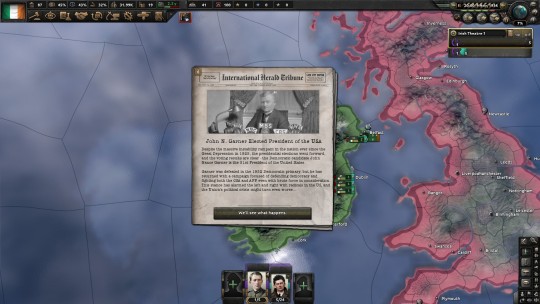
12 February 1937 - Home of Michael Collins, Cork, Ireland
“The United States of America has faced challenges since its founding, but it is an enduring republic. When we were invaded, we fought off our attackers. When the Great Storm hit Galveston, we built cottages from the storm lumber. When Black Monday reached our shores, we passed the Garner-Wagner Act to deliver our people relief. The American people, through this election, have made their will clear. They do not want the empty promises of Jack Reed. They demand more than the sayings of Huey Long. Words are not enough, action is required. That is what I shall promise: action. We will stand firm against the threat of populism and syndicalism.”
Benjamin Franklin, after the Constitutional Convention, was asked whether the United States was a democracy or a republic. His words were: ‘a republic, if you can keep it.’ That was not mere wit, but a charge; a sacred duty given to every citizen. Today we say: it is our republic, and we shall keep it.” -US President John Garner, Excerpt from Inaugural Address
In Michael Collins’s case, war never seemed to have a countdown, but sure enough, the war looked like it would begin in 30 days. Just the thing to ruin his vacation; he had hoped to spend a few days in Cork to recharge his batteries, and ended up having indigestion and headaches the entire trip.
The United States had been a roiling mass of discontent since 1925, but it had only gotten worse during Black Monday. President Garner had won a lot of support in his campaign, which had focused on trumpeting the successes of the Garner-Wagner Act and touting the President’s willingness to fight any who threatened democracy. “A snake is a snake is a snake,” Garner had been fond of quoting on the campaign trail, swaggering with a pair of revolvers. “I plan on working to fix the mess that we’ve found ourselves in. If Jack Reed and Huey Long want their voices heard, I’ll listen to them. If they want prosperity for America, they’ll listen to me. And if they want to fight, they’ll get one. I don’t plan on striking first, but as God is my witness, I’ll be striking last!”
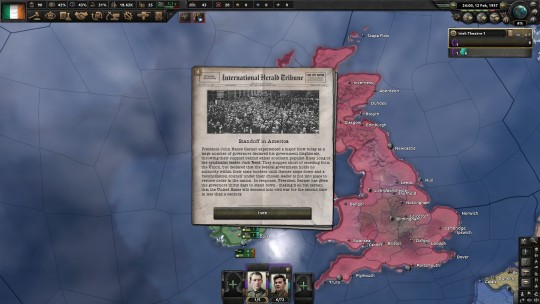
That had been enough for the Presidency. Jack Reed’s Socialist Party of America and Huey Long’s America First Party had strong regional support, but neither movement received enough votes to beat the Republican candidate Alf Landon, let alone Garner. Yet the victory was narrow, and both candidates claimed voting irregularities arranged at the polling places by supporters within the state voting commissions, along with other accusations of beatings and intimidation campaigns. Herbert Hoover endorsed Garner in a show of cross-party American solidarity, and Landon himself was a guest of honor at Garner’s inauguration. Garner had already promised the Republicans some Cabinet appointments in the hopes of building a coalition government strong enough to stop Long and Reed. It was an uphill battle; the 1936 voting season had been marred by political demonstrations turning violent, they had even called it the Red Summer, and now Long and Reed were railing against the legitimacy of the vote.
When the populists had made their accusations, the governors in their regional strongholds had backed Long and Reed. The populists, it seemed, had called President Garner’s bluff. The governors demanded a “national reconciliation council” under their talking head, and both had made it plain that the other would not be welcome on it, making it all but certain that war would come, and it would not be small. Jack Reed was popular in the Steel Belt and Huey Long had an almost religious appeal in Louisiana and in the rest of the Southern United States. Reed had much of the industrial heartland, but Long had far more pull among the military including high ranking officers. It wouldn’t be an easy fight, no matter what Texans had to say. In both ways, it was bad for the United States.
Collins had hoped it wouldn’t be war, but he was sure that it would be. If Jack Reed was able to successfully overthrow Garner, the Internationale would be emboldened. The Communards might still be reluctant to face Germany, given how large such a war would be, but Mosley would almost certainly want to snap up Ireland to carry forth syndicalist momentum. Anti-Irish rhetoric had only intensified in the months following Ireland’s meteoric 1936 rise, with Mosley claiming that Michael Collins had become “every inch the oppressive king he fought against.” Collins laughed when he was first told it, but as the days went on he seethed against the man, wishing he could have five minutes alone in a room with him. He was sure his sainted ma would not look fondly on him for beating on a man with a limp, but she’d forgive him.
When the reporters asked for a quote, Collins was sure to give them one. “Look at Mosley in the war. Gallivanting around in an aeroplane like war was just boys at camp, crashing trying to be a showboat. I suppose I must be kind, he tried to prove he was a brave man, I’m sure it’s not his fault he ran behind a desk before a year was out. That’s where he’s most comfortable, hiding and sipping his gin while he sends young boys to do the fighting and dying.”
Collins had a good laugh, but he made sure to tell his diplomatic service to make sure that Ireland would have plenty of friends on both sides of the Atlantic, just in case the Union tried anything. Laugh in public, but service your pistol in private.
---
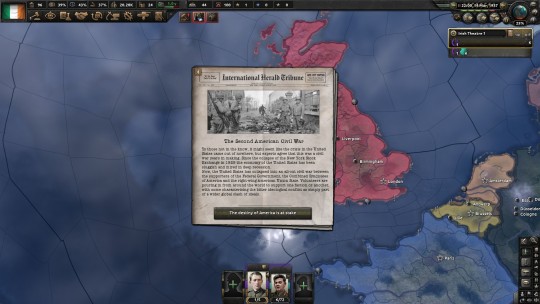
14 March 1937 - Áras an Uachtaráin, Dublin, Ireland
It was war. The entire world was aflutter with the news that the United States had descended into a civil war. President Garner’s deadline had come and went, and both Jack Reed and Huey Long had declared war on the United States. In response, Garner had appointed General George Marshall as Chief of Staff of the Army. The Internationale had already voiced its support for Jack Reed, with Chilean, Communard, and Union supporters already on their way to support the newly-formed Combined Syndicates of America. The German Empire was far more reserved in its support. German-Americans primarily lived in areas controlled by the Combined Syndicates, and the United States government had primarily conducted a pro-Entente policy during the Weltkrieg, leading the Kaiser to support Huey Long out of pure pragmatism. Canada had fallen into debate within the Houses of Parliament on who they were supporting.
Collins had no such reservations about debating who to support in the Dail. Collins had sent out a call for a volunteer division, the 1st Thunderbolts, and had placed them under the command of Daniel McKenna. The East Coast was dense with urban areas, and McKenna was just the man to fight in that difficult urban war, having fought the English in the cities before. The Thunderbolts had been training for months in preparation for the outbreak of hostilities. Most were young men, too young to have seen the Independence War, but their officers and senior NCO’s had. That would carry them, fighting in unfamiliar territory would mean they would have to adapt quickly and rely on the experience of the leaders. Other IRA volunteers, particularly those with families in the United States, had opted to go there themselves, fight in the American army, and return later.
The first target would have to be the syndicalists. With their position in the American industrial heartland, they’d have the manufacturing prowess and the civilian manpower to build and repair war materiel far faster than the mostly rural southern states. They would have to trust in their greater manpower and equipment to hold the southern front against the aggressive generals of the American Union State. The United States had begun mobilizing forces on the West Coast to get them to move east, and requisitioned several rail lines for exclusive military use, but it would be hard fought. America was going to need all the help it could get.
---
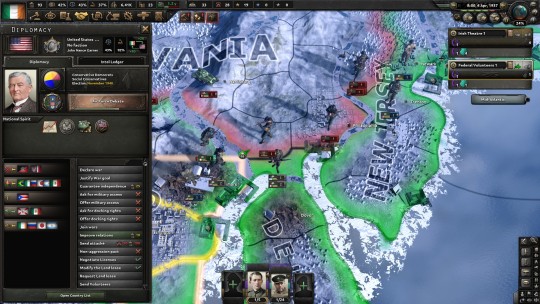
13 April 1937 - Northern Maryland, United States of America
“We have traitors to our left, and traitors to our right
Our Congress and our president have long since taken flight
No ammo, no armor, no pills, no cargo
No prayers, no chance, no hope of tomorrow
Just you and me and a hell of a lot of fight.” -Frank McHewlitt
Pennsylvania had become a battlefield for the Second American Civil War just as it had for the first. The Pennsylvania governor had declared for Jack Reed, but the Federals had made a march into central Pennsylvania, seizing York to Fulton counties, but lack of manpower, difficult terrain, and Communard volunteer tank brigades had ensured any excursion was short-lived. From New York to the Midwest was controlled by the Syndicalists. Fearing being overrun, Joseph Kennedy Sr. had asked Canada to send an occupation force to protect them from the Syndicalists. This had infuriated President Garner, but pragmatists in his Cabinet had argued that the region was indefensible since the Syndicalists held New York, and better that the Canadians occupy it, and the Combined Syndicates risk a war with the Entente, than the factories be taken over by Jack Reed. Further south, Canada had sent a force to occupy the Panama Canal after the Americans had withdrawn their garrison force. The Canadians had said their mission was to protect trade, but had banned ships flying Communard, Union, or Chilean flags.
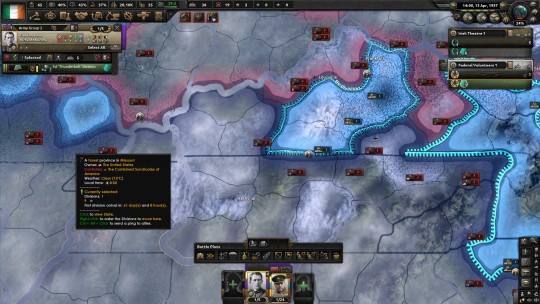
Further south, Texas to the Carolinas, and everything south, had pledged loyalty to Huey Long’s vision. Several companies had even signed on to the “Share Our Wealth” program. His men were heavily-armed and competently led, and they had already made significant inroads pushing north into Kentucky from Tennessee, even making contact with and fighting Jack Reed. George Patton had been named the overall commander of the American Union State, and on land the America First Party had shown themselves to be exceptional fighters pound-for-pound. Their goal had been to push and seize whatever territory they could, to turn the factories over to Longist control and get their war materiel production up to match the Federals and the Syndicalists. It had been remarkably successful, Patton’s armor techniques had run circles against disorganized Kentucky militia and revolutionary syndicalists alike. Already there were unconfirmed reports of mass shootings of CSA prisoners by AUS irregulars. The Federals were hard-pressed, often surrounded and potentially encircled by hostile forces in Kentucky. Only the chaos of the war and the close proximity of all three forces, kept them from being killed outright. Desertions, particularly from militia unfortunate enough to be in the encircled regions, were high.
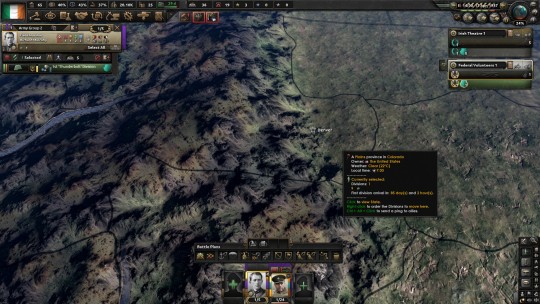
Washington was no longer the capital. With Maryland under fire and the Firsters pushing from the south into Virginia, Garner had decided to temporarily move the capital to Denver, where he could oversee the political business of state. MacArthur had elected to remain in place as the commander of the East Coast Enclave, suggesting that Dwight Eisenhower take command of the main Federal forces in the Midwest. “He’s a Kansas man, there’s no man better in command from the Midwest. The troops will fight tougher and harder if they know we haven’t abandoned them. Don’t worry, Mr. President. Those bastard traitors won’t set a foot in D.C.” With his trademark corn cob pipe and a wave to the press, MacArthur took a ride on a Vultee V-1 to take up command, with Eisenhower being named the overall commander of Army Group West, with the goal of pushing east from Kansas into Missouri.
MacArthur welcomed the service of the volunteers sailing and landing on the Chesapeake, no traitor forces had been able to ensure naval supremacy on the East Coast and none were willing to risk firing upon a flagged vessel and invite any nation’s full-blown entrance into the conflict. Lavr Kornilov, eager to project strength and stability after the assassination of President Kerensky. Hirohito had also dispatched volunteers citing the strong relationship between the United States and Japan and the need for legitimate government to be re-established in the United States to project stability in the Americas. Calles in Argentina, eager to re-establish the Monroe Doctrine to act as a bulwark against the Patagonian Worker’s Front, and always eager to fight syndicalists. Brazil likewise had ordered troops to support the United States. Mexico, eager to avoid any war spilling over their borders, had closed the borders to the American Union State and had sent divisions through the Gulf of Mexico before the Longist navy could seize control of the waters and potentially cut off trade and transit. MacArthur ensured that each division had several bilingual Americans to serve as liaisons and communications personnel. He couldn’t command the volunteers, but he did demand adherence to military law and that any abuse of US civilians or military personnel would be dealt with by firing squad. Similarly, MacArthur promised his own men that they would be punished harshly if they stole from or fought with Federal volunteers. Regular correspondence was mandatory, and passwords changed regularly to allow foreign soldiers to identify themselves quickly to friendlies, passed via radio operators who had signed up with the Federals in record numbers when President Garner forced a bill and executive order expanding the civil rights of Native Americans to shore himself up for the upcoming emergency. The Navajo Nation, who provided one of the largest units, dispatched signals operators to coordinate with the volunteer brigades, providing exceptional communications security and coordination between the Federals on both fronts.
Yet things were not going well. MacArthur had enforced military law within the East Coast enclave, and garrison forces frequently looked to seize supplies and materiel for their war effort. Oftentimes, a token effort at compensation or promise of restitution to come later was the only balm in Gilead; it did not help those who starved.
The volunteer forces moved north to the Mason-Dixon line, where the Combined Syndicate militia were threatening to move south into Maryland from their regional headquarters in Philadelphia. The Russians opted to secure themselves in Baltimore, while the Argentine and Mexican forces moved to Cecil County to secure Delmarva from the syndicalists seizing the east bank and potentially cutting off vital access to the Chesapeake. McKenna and the Irish 1st Thunderbolt, acting aggressively, crossed into Pennsylvania and secured themselves in York. Not willing to pass up a fight, Russian and Irish volunteer brigades pushed into Lancaster County, threatening Philadelphia and forcing the Communards to reinforce their position lest Philadelphia fall and the road to New York be pushed wide open.
---
17 April 1937 - Economic Committee of the Dail, Dublin, Ireland
It had been a constant flurry of activity in the new year. The Dail was debating loosening immigration restrictions to help bring in new blood to help support Ireland’s effort to modernize. Even if good policy and hard work had led Ireland out of the depression following Black Monday, manpower was still the hard limit on everything they could do. Once unemployment fell, there would be no new employees for businesses, and they’d turn away from Irish investment.
There had been two major sources of pushback against immigration reform. The Unionists in Ulster had been vocal opponents, calling the efforts part of a planned demographic shift to stock the north with people that would sideline their concerns as Unionists. Their proposal had instead suggested an increase in immigration from select countries, notably Canada, Australasia, and the British Dominion of India. Gearóid Ó Cuinneagáin was far more hostile to immigration overall, demanding no immigration save from Celtic-majority countries, particularly those who wished to depart the Union of Britain from Scotland and Wales. Some of the measures proposed had truly been radical, such as instituting a Gaelic language entrance exam to new immigrants. The hAiséirghe crowd had always been a touchy subject, they had enough support in Munster that they couldn’t be ignored as much as Collins wanted to throw the bastards into the ocean.
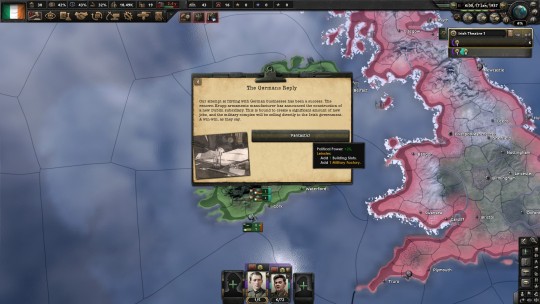
Collins had been lucky, his Dublin financial capital idea had already been receiving positive responses. The German Kaiserreich, still deep within the throes of Black Monday, had debated whether or not to permit German businesses to invest in Ireland. The protectionists in their government had argued that the last thing that they needed to do was open up subsidiary companies in Ireland and send work away from Germans. The market liberals were far more enthusiastic, suggesting that the profits made could be reinvested in Germany; an influx of cash that wouldn’t increase the money supply and devalue the Mark. In the end, Wilhelm II had agreed to the proposal. He had known that the Irish Republican Army had been looking to re-equip their forces, and Krupp could easily manufacture rifles and mortars with a sizable government contract. Krupp opened Krupp Rüstungsbetriebe Irland, redesigning the Krupp Radreifen into the shape of a shamrock.
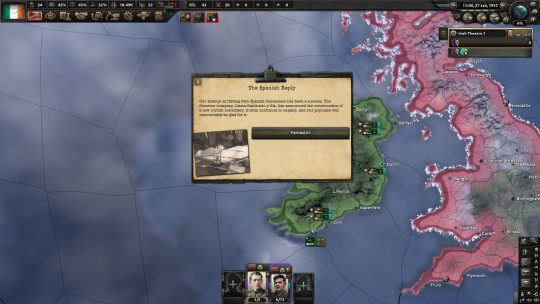
The Kingdom of Spain had also looked to establish an arms company in Ireland, eager to arm those who were also hostile to the syndicalists, and quite isolated on the European continent, with France and the German Protectorate of Morocco making an uneasy set of neighbors. Having a well-armed Irish Republic was a benefit to King Alfonso, who agreed to set up a subsidiary of Llama-Gabilondo y Cia SA, taking the name Dóiteáin-Gabilondo Incorporated, and selling their famous pistols to the Irish Republican Army. With regular army drills, and now a larger armaments industry within Ireland itself, a more significant and professional Irish Republican Army was starting to take shape.
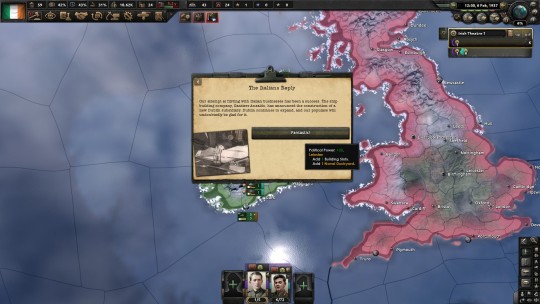
The Italian Republic, floundering in the wake of massive German and Austrian stock selloffs, were eager to find ways to bring in cash and stabilize their own economy. Seeing a pressing need, the Italian Republic opted to establish a naval manufacturing dockyard in Dublin as Gio Ansaldo Irish Sea Shipwright, Ltd, to help produce submarines for the Naval Service. Italian engineers could work in Ireland, the revenue would flow into Italy, and the Irish would receive a powerful deterrent against the Union of Britain’s navy. Working in the choppier northern waters was different from the warmer and calmer Mediterranean, but the Italians proved up to the challenge, christening the first Irish U-Boat the new Fenian Ram.
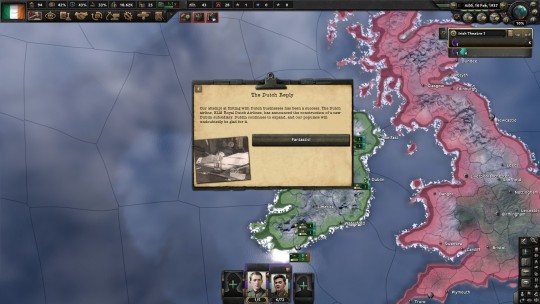
The rush of European activity to invest in Ireland had not gone unnoticed in the Netherlands. After a fierce and competitive bidding war, the Dutch government, very busy with their preparations for the upcoming elections in May, had given the go-ahead for Royal Dutch Airlines KLM to do business within Ireland. Rather than operating a strict subsidiary, as the government was still facing the worst of Black Monday, Royal Dutch instead opened a joint venture with Aer Lingus, operating a civilian airfield that would bring in much needed tax revenue, and providing expertise for the construction of a military airfield in Leinster. The Union of Britain had lodged a formal complaint against the move in the Netherlands, but the ambassador had been dismissed out of hand, the official response being “Ireland has a right to the sky, and Britain has no right to dictate policy to the Netherlands.”
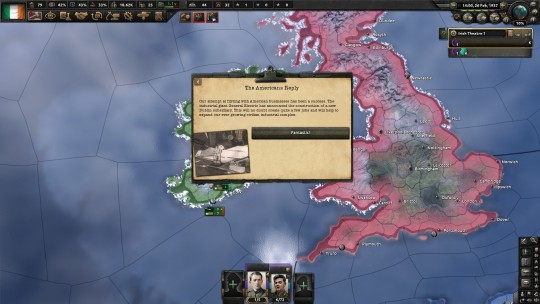
The United States had been considered highly unlikely to invest in Ireland. Even with the positive relationship that had existed between the two countries, the USA had been facing an existential crisis. To Collin’s great surprise, Garner had actually encouraged American companies to open subsidiaries in Ireland before hostilities broke out. In a diplomatic message to the Irish President, Garner had written: “I am certain there will be war. American industry will certainly not be spared. This initiative may save American lives and enrich both our countries. If the worst comes to pass, may God protect us both.” General Irish Electric, as the company titled itself, designed a logo incorporating the Irish harp in the signature “G” of the GE logo. The company received a grant from the National Industrial Investment Fund and purchased a factory abandoned during the Black Monday fallout, bringing up to speed in record time to produce civilian and industrial-grade electronics. Almost immediately, GIE had orders tasked almost to capacity for factories across Ireland to upgrade their own operations, throwing itself into the greater industrialization efforts that Michael Collins had championed the previous year.
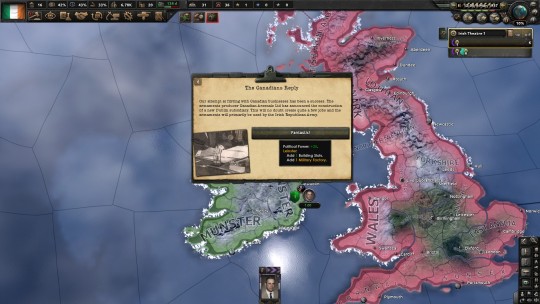
The Dominion of Canada was a much more difficult beast to wrangle. Edward VIII had made no secret that he wished to reacquire not just the British Home Isles, but the British Empire as well; he would not be a second-fiddle to the Kaiser. That would mean the Six Counties, surely, perhaps even re-establishing the Free State as a Dominion. Collins had debated even making the offer to Canada, but a good relationship with Canada was, putting Edward aside, a sound policy. Canada needed money to support their war efforts, and a friendly relationship with Ireland would mean less problems when launching their operation to take back the Home Islands. Collins privately feared that they would want to use Ireland as a staging ground. Ireland had situated itself as a prominent financial hub, and since Dublin was designated a Special Economic Zone, it could potentially be very lucrative and offer a way to sell to the rest of Mitteleuropa without dealing with the Kaiser. The Canadian government had assented to Canadian Arsenals, a crown corporation to open a subsidiary in Dublin named North Atlantic Arms. Collins made sure that it acted in all things as a private company, insisting that King Edward appoint an executive staff the same as any other business. That had been a headache in the Dail, with Eamon de Valera angrily demanding not to sell Irish land to King Edward. Collins had countered that Ireland was a free and independent republic, and that the King had to obey Irish law rather than dictating laws to Ireland.When rumors came around that Jim Larkin had supported Dev’s objections, the Fianna Fail politician withdrew his opposition in favor of a more moderate compromise, asking only that the Dail be presented the terms of the contract in open session so that they could vote on them. Dev’s desire not to give Larkin more ammunition had rapidly diminished opposition to the measure within Fianna Fail, and Sinn Fein offered only a token dissent, permitting the venture to go forward.
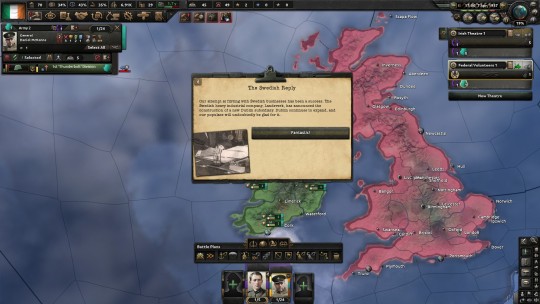
With the outbreak of war in the United States and Ireland’s rapid industrialization, Sweden had sensed an opportunity to open a subsidiary business in Ireland as well. AB Landsverk had originally sought to open a tank manufacturing plant, since the Irish tanks were largely outdated and the Irish Republican Army was going to need to modernize its arsenal. Fierce protest erupted from the social democrats within Sweden’s Parliament, opposing the idea of arming Ireland and facilitating a possible war between Ireland and the Union. The hawks within Sweden had supported the venture, but military arms, even support equipment, could not secure a large enough coalition for the Economic, Defense, and Foreign Ministers to agree to the venture. Not wanting to lose out on the potentially lucrative deal and already facing their own problems with syndicalist unrest, Sweden’s market liberals had offered a compromise within the Riksdag, allowing Landsverk to open Landsverk Inneal, specializing in tractors and harvesting equipment to support the modernization of the Irish agricultural sector. Several prominent military analysts noted that the new Inneal tractors, with a few modifications, looked suspiciously similar to a light tank with the turret removed, but these were dismissed as products of an overactive imagination by both Swedish and Irish military analysts.
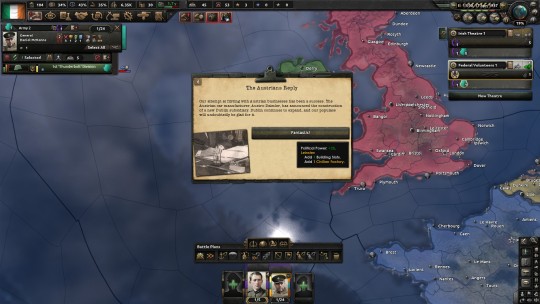
The Austrian Empire was in a difficult position in 1937. Emperor Karl I had been making significant plans for his Ausgleich Federation plans, and saw the Irish initiative not simply as a means to support his economy, but as a means to demonstrate both Austrian power and his willingness and initiative to support cooperation efforts for mutual gain. The Emperor had made his commitment to pluralism plain within his proposed federative model, he had hoped that participating in Collin’s economic initiative would help sway skeptics and naysayers to his side to give him greater support against Hungary. If it could help his economy and put neutral voters who cared more about their own personal livelihood than the greater plans of Austria-Hungary, that was fine as well. Daimler founded Irish-Daimler and focused on developing automobiles and lorries. While the Emperor could not be there in person, he had prepared a statement for the opening of the plant in Dublin. “Irish-Daimler is in the business of Irish business. Her success is our success, and our success is her success. May we both prosper in the days ahead.”
Eight nations had opted to do business with Ireland in such a short period of time, and there had already been murmurs for other nations to do likewise. The success of Irish Black Monday reforms had been the talk of the European financial sector. Even distant Japan had expressed an interest in perhaps opening a branch of one of their zaibatsus in Ireland to sell to Western markets, though such a discussion was in the planning stages. When interviewed by The Financial Times, Lemass had made the quote that had made the headlines. “Ireland is the Emerald Isle. She always sparkled in our hearts, now everyone can see it.”
When Michael Collins had heard that, he smiled. The man had the head of a businessman but the heart of a poet. The head and the heart needed to complement each other if he wanted to see Ireland through.
---
8 May 1937 - Áras an Uachtaráin, Dublin, Ireland
As the war passed into its third month, Collins started to wonder about the upcoming elections in the fall. America had been on his mind a lot lately. An emergency act by the Oirechtas called the Díodean initiative had allowed Americans seeking refuge to come to Ireland, and plenty had taken Collins up on his offer. Many immigrants came with much of their wealth with them, which had provided an influx of capital. Even more valuable, however, was the technical knowledge. Many of the immigrants had been factory managers or entrepreneurs, and they had knowledge which made them highly valuable in the industrial sector. Not every tale was so fortunate, however. Some culture shock was perhaps inevitable, but it had been incredibly slow going. Collins had remembered the first time he saw a new settler to Ireland drive on the wrong side of the road and cause a car accident. This felt like seeing that unfold in slow motion on a national scale. The poor Americans had felt the Irish were cheating them out of wages and exploiting their desperate circumstances, while the wealthy felt their standard of living drop precipitously.
The hAiséirghe crowd again troubled him. Reports of nativist gang uprisings in the poorer parts of cities and rural areas were on the rise. There were demonstrations that the new arrivals were stealing all of the good-paying jobs; this had been going on since the new immigration reform but now was reaching a fever pitch. The Unionists again rallied against Collins, accusing him of colonizing the north with people opposed to King Edward under the guise of humanitarian aid to defeat the Ulster Unionists at the ballot box. They demanded a series of refugee and work permits that did not confer voting rights as opposed to outright immigration and naturalization. That had caused a firestorm on the debate floor, causing no shortage of headaches for Collins.
To alleviate the shortages, Collins had organized refugee brigades in the Republican Army, where young men could earn a wage and provide a livelihood for their families. The Yanks were excellent shots, and Collins had hoped that seeing immigrants wearing a uniform would cause the locals’ respect for the military to undermine nativist tendencies. It was a mild success at best, mostly in Leinster where there had already been fewer problems overall. Collins had weighed outright banning the Ailtirí na hAiséirghe, but that would just send them underground like the Labour Party had. He had to settle for punishing assaults when they were reported, and increasing Gardaí patrols to keep the peace.
In the leadup to the elections, Collins had seen cracks start to form in his ironclad voting bloc. While syndicalism had little popularity in Ireland itself, Sinn Fein had seen an upsurge in popularity with Black Monday despite Collins’s efforts. The Irish Christian Front and the Ailtirí na hAiséirghe had campaigned against him thanks to his immigration policies. Fianna Fail had campaigned on greater liberalization, and the National Centre Party had wanted to re-orient foreign policy to a more pro-Entente position. Sinn Fein and Fianna Fail had opted to engage in tactical voting, with candidates withdrawing from ballot races in order not to split the vote. Jim Larkin had endorsed the move, promising to work with Sinn Fein to provide greater relief to the Irish working class. The Irish Christian Front opted to boycott the elections and both they and the Ailtirí na hAiséirghe accused Collins of bringing in foreign refugees to ensure he had the votes needed to win.
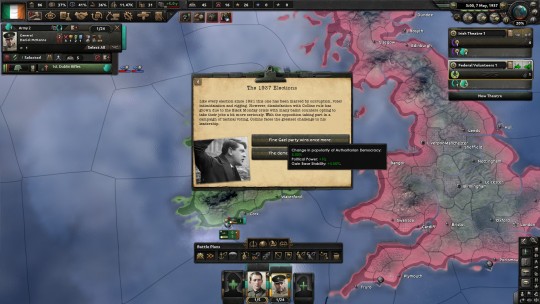
At a closed door meeting, Collins was asked a simple question. “Sir, what should we do about the election?”
Collins, his hands shaking, had only one response. “Whatever it takes.”
---
15 July 1937 - West Virginia, United States of America
“We’re in the right thick of it now, ain’t we?” Daniel McKenna shouted over the din of battle.
The East Coast Enclave had stabilized its borders after the early initial push, but still faced the difficulties of being surrounded by the enemy. Food and water shortages, irregular supply shipments, and losses from attrition were starting to take their toll on the beleaguered Federals. The Appalachian mountains had stymied Syndicalists pushing in from Ohio and Illinois, and the hilly and forested terrain had helped somewhat slow the push by Long’s forces, but only barely. Eisenhower had more success on the west, where the greater manpower has really started to pressure the American Union State on their Texas front.
The Federals still controlled the air though. That had made securing their defenses much easier. Flying over the Great Plains was effectively a death sentence, and few had the nerve to establish air cover on the east coast. That was a small comfort to Dan McKenna, who had gone to the Applachians in response to a new Syndie push. The Federals had retaken Charleston in June, but their position was tenuous there, and with new militia units being sent into battle, someone had needed to defend this key western outpost.
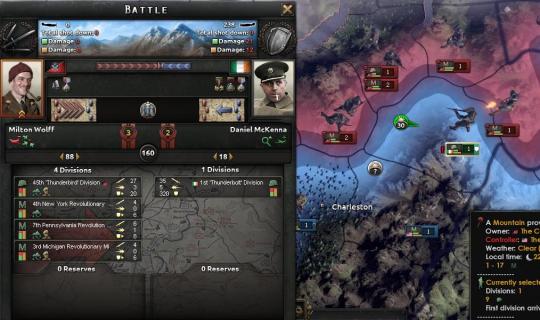
American militia units had stayed to defend the city, but McKenna had looked to secure the hills to the northeast. The Applachian plateau looked to give a good vantage point for artillery if any could succeed in the arduous task of towing them up to that position. Loyalist civilians had offered to do it on their own, pulling the units with their own work trucks, but that would be a dangerous undertaking without escort. McKenna took his Thunderbolts, with their own artillery pieces, to secure the hills first, while the militia guns could follow second when the way had been cleared. The Syndicates, tipped off by sympathetic informants, launched a massive push with their own 45th Thunderbirds, supplemented by local revolutionary forces, to prevent bombardment. The battle plan called for an overwhelming attack to break the dug-in mountain entrenchments, attacking from multiple directions in an attempt to dislodge the stubborn Irish defenders and find a weak spot.
McKenna demanded that the forces hold, using high-explosive burst shells over the heads of the enemy to maximize effect on the enemy. The engineers had dug in extensively, and had used dynamite to blast further fortifications and built entrenchments. The Thunderbolts only had a few guns, which were primarily pointed toward the northwest against the more highly-trained Thunderbirds. At such high elevation, and with such difficult terrain, evacuating casualties was difficult on the mountain, and men sometimes collapsed where they stood due to a combination of fatigue and high elevation.
That had been days ago, and the Thunderbolts were in tatters. The less wounded had even taken up shifts at night, or taking over service positions so able-bodied men could shoot and spot for the artillery. They had been holding, but just barely so. If it hadn’t been a mountain, they would have already been overrun. “I’ll be damned if I die on some cold rock half the world away from home.” McKenna defiantly continued to stand, hoping to wear down the superior numbers with artillery shells. He was the Wall of West Virginia, and he wouldn’t let the bastards through.
---
10 September 1937 - Pittsburgh, Pennsylvania
It had been months of hard fighting. Charleston had remained in Federal hands, and the front had stabilized, but all hopes of recovering the Federals in Kentucky were lost. The loyalists could only hope that the army groups had disbanded to make their way back to Federal territory in smaller numbers rather than being shot en masse, or worse, deserting to fall in with the enemy for their own salvation.
MacArthur had relied on the volunteers to fight a great deal of battles, more than he had preferred. The states under his control were tapped out for manpower resources, and if he started poaching from the factory floors for more able bodies he’d run out of supplies. Supply was irregular, especially for fuel, which he needed to keep the planes in the sky and the troops moving across the front. Olds and Tunner were able to airlift a lot of supplies, but demand always outstripped supply, and the more supplies he lifted the more danger there was for explosions in the cargo holds.
Ultimately, MacArthur decided that he needed to attack, to keep the pressure on the east so that the Syndicalists did not pull more men to prevent Eisenhower from marching toward Chicago from Kansas and the Dakotas. The Syndicates had been attacking south against the American Union State and fortifying out of New York City, and MacArthur had theorized that they would be weak in between those two strongpoints. The Brazilian and Argentine volunteers offered to push toward Philadelphia, with the hopes of breaking the regional command post and sending Syndicalist forces into disarray, while the Irish opted to push into Pittsburgh to seize the valuable steel mills and threaten a push into Ohio. The Mexican volunteers opted to remain in Virginia to help guard the line against the Longists; they had feared if the American Union State won, there may have been calls to expand further south to seize valuable oil and mining territories; fears of the Golden Circle expansion as it was dubbed in Mexico had been a hot button issue for the Mexican volunteers. If the Irish could secure Pittsburgh, that would give them control of the railroad junctions and the rivers, and allow MacArthur to bring in militia units to bring the territory under control with little fighting. With that, they could push further north toward Erie, splitting the Syndicalists and isolating them in New York. With Canada closing the border to the Combined Syndicates, even to the point of having the Royal Canadian Mounted Police arrest suspected border crossers and turning them over to the Federal government in Denver, that would render a similar fate to the lost Federals in Kentucky. MacArthur just hoped that his south could hold against the Firsters. Trading Virginia for Pennsylvania was not a winning proposition.
The B&O Line had been cut early, forcing McKenna and the Thunderbolts to march for most of the trip. Even in September, Pennsylvania was still hot, to help with water and the unfamiliar terrain McKenna had largely followed the Mononghaela river. To the east, he had Federal troops supplemented by Maryland militia moving north to take Harrisburg. McKenna force-marched his troops into Syndicate territory, hoping to secure a clear pathway along the rail lines for American repair crews to fix the B&O.
McKenna had been fortunate, western Pennsylvania had been defended by irregular militia units, poorly armed and lacking artillery support. In many cases, McKenna found that they didn’t have enough rifles for every man and only a few machine guns, some had taken to using shotguns better suited for partridge than men. When he was lucky, a few barrages from the field guns was enough to send them packing, but even without that, a dedicated attack usually was able to force back the disorganized units. A pity he didn’t have tanks, even a couple of old Weltkrieg landships would simply be able to drive to Pittsburgh unimpeded as long as it was gassed up.
The locals were fiercely divided. A few times McKenna had gone near towns, he had been welcomed and told where the Syndicates had kept their ammunition depot. Most of the time, however, the homes were ransacked, the supplies taken. Horror stories came to McKenna about “war syndicalism,” Reed’s name for the efforts taken to ensure his fighting men had the food they needed to fight. Sometimes it was the Combined Syndicates directly, but more often it seemed to be neighbors seizing on old grudges, summarily beating those they suspected of disloyalty and stealing their possessions, donating them to Reed as an act of solidarity. Worse still was what happened to those suspected of disloyalty. The Combined Syndicates offered a bounty on saboteurs and informants, and that had led to hastily-convened People’s Courts, serviced by hanging judges. Even so, there were plenty of people loyal to the Combined Syndicates, shouting their approval at finally destroying the brutal oppressors of Wall Street and their puppets in the Federal government. For a moment, McKenna thought of Ulster, and remembered everything he had heard 15 years before, and then he remembered the refugees from the British Isles after their revolution.
Pittsburgh had been hastily-fortified, with burned out hulks of cars blocking the bridges into town, forcing McKenna to navigate the crude fortifications with great care. The civilian population had largely huddled in buildings with boarded-up windows. The large buildings had been long ago hit by artillery fire or bombings from aircraft. Rail tunnels had been places of safety, McKenna’s scouts had found a few brave souls trading for various materials on picnic blankets. The mayor, who had thrown in his lot with the Syndicalists, had fled the city with the rest of the CSA, and they had thrown those city councilmen loyal to the Federal government into the Ohio. Coordination was largely infrequent, done by amateur radio. The civilians largely wanted to be left alone, out of the civil war, but the war had come to them despite their best wishes.
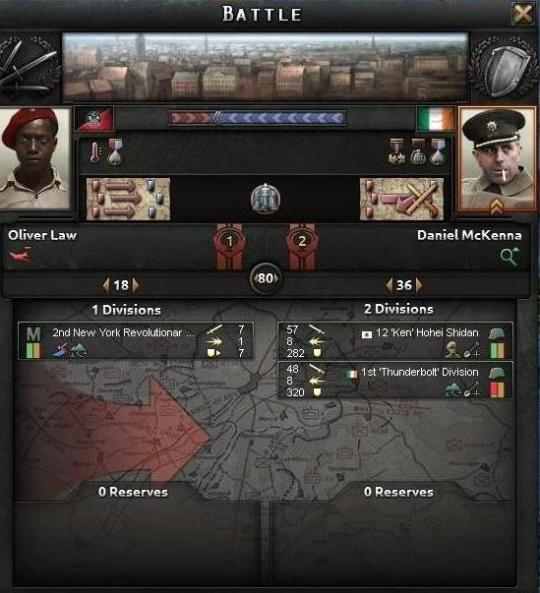
McKenna set to work, ordering his engineering corps to get the guns into firing positions. He positioned men near the Alleghany to prevent any CSA attack using the river to bypass his fortifications, and fortified the major exits with sandbags and machine guns. He had barely gone through half of his fortifications when he had heard the bad news: The Syndies were on the march along the Alleghany, and they would attack the city soon.
Yet, McKenna was not alone. The 12th Hohei Shidan, volunteer forces from far-off Japan, had come to support the Irish forces, and they had brought with them their Type 90’s, doubling McKenna’s supply of artillery. The Japanese and Irish soldiers met on the south side, and drew up plans for an attack. McKenna was given overall command, and elected to put his Irish veterans in the more dangerous forward position while the Japanese would fire on the CSA to draw them in under a battery of withering artillery fire. Once the enemy had descended past Lower Lincoln and could no longer enjoy visibility from Upper Lincoln, the Irish would ambush them in close quarters.

The CSA announced their attack with a radio command ordering all civilians to remain indoors, and all “foreign invaders” to surrender to the 2nd New York Revolutionary Guard, for handling by the legitimate United States government for repatriation. The 12th Hohei Shidan responded with a cannon barrage, thus commencing the Battle of Pittsburgh at 0900 on 10 September. McKenna’s Thunderbolts fought in ambush-and-retreat tactics, dividing themselves into seven-man fireteams. McKenna would fire on advancing CSA forces, retreat into a building, then have a second fireteam flank the New York Revolutionaries from across the street. Casualties were high on both sides, especially among the Irish who often refused to fight until in incredibly close combat, hoping the shock of the ambush would carry the day. Friendly fire incidents were high, especially as the day went into night, both from accidental fire on friendly troops and sympathetic civilians accidentally firing on who they believed were enemy soldiers. Yet the day stood. On 14 September, his squads battered and American troops pushing through central Pennsylvania, Oliver Law reluctantly ordered a retreat to the northeast. Western Pennsylvania stood liberated, but the war was not over yet.
---
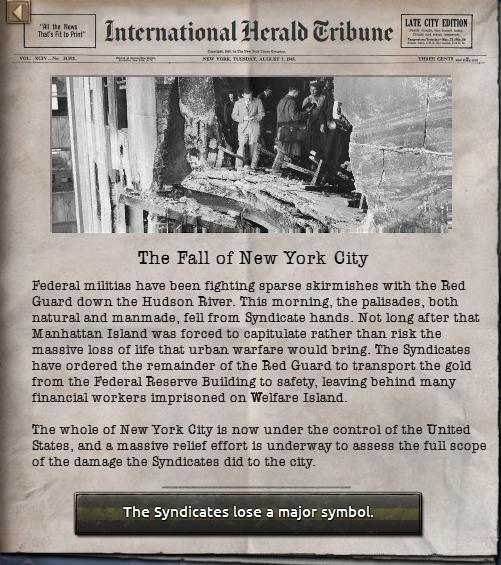
20 December 1937 - Welfare Island, New York City, United States of America
The icy winds of winter were howling, but the pit in Daniel McKenna’s stomach wasn’t from the cold. He had hoped to warm himself with a cigarette as he surveyed the successful conquest of New York City, but that had all left him. Naught but a short time ago, the celebration had been high. The Syndies had lost both a major symbol and, perhaps more pragmatically, their eastern command center. The Dominion of Canada had officially supported the Federal Government, and there had been Canadian, Indian, and French Republican volunteers sailing to Maryland to join MacArthur and the Volunteer Brigades, along with massive shipments of weapons from the Entente. Manhattan had surrendered rather than risk a massive urban brawl amongst the skyscrapers. That too, had seemed like a cause for celebration, but there was little sense of Christmas cheer among those who were picking through the ruins of New York City, for they had finally come to Welfare Island.
Inside, McKenna had found cell after cell of prisoners, skin stretched and hair falling out from starvation and malnutrition, their bodies broken from months of hard labor. When New York had fallen to the Syndicalists, they had imprisoned anyone who had worked in the financial sector, any who rented an apartment to another, or any who they considered to be bourgeoise, and demanded that they atone for the crimes of their previous lives with new, honest labor for the Syndicalist cause. They had been forced into the most dangerous jobs of the arms industry, like manufacturing artillery shells to the point where their skin had turned to a greasy yellow. Bleeding gums and fingers, limbs lost in machinery or explosive accidents were routine, each prisoner was a laundry list of atrocities written out upon their bodies.
Each horror that McKenna heard made him feel numb. He had nearly torn his gloves in two after listening, but he had made sure that he had heard it all, and that his staff heard it as well. A patriotic young woman, formerly a social columnist for the New York Tribune who had signed on to help with the support staff, volunteered to transcribe every word. “Be damned, lass, you’re a damn sight braver than any fella. Write it down, every bloody word, and know that ye’ve got a ironclad heart three times larger than any bastard who tells ye different.”
McKenna had dispatched three messages from New York. The first was to General MacArthur, who had said: “Am pleased to deliver to you New York as an early Christmas present.” The second was to Michael Collins, relaying a request for more reinforcement of men and materiel. The third, a private correspondence, bemoaned what he had seen. “The brutality of what I’ve seen is beyond words, and the only thing that breaks me more is the thought that this is not some singularly unique moment of malice, that we’ll find another Welfare Island in the South run by those America First bastards. God help me, is this what we left the English to in ‘25? Did we look at an Englishman for all those years and see the English and not the man?”
“Private. Bring all the Syndie prisoners we’ve got, make them see what went on here, make ‘em stare at each one. If they look away, hit ‘em. Then find the officers, and see which ones knew about it. And if ye find one that did...hang ‘em from the Brooklyn Bridge.”
---
Alright, that’s the second chapter, with the Syndicates on the ropes and the Firsters being slowly ground down in the western theater. The third chapter will handle the defeat of the Syndicalists and the Firsters and Mosley’s opening shots for his invasion of Ireland. Let me know what you think. And yes, I know some of the pictures are from 0.12, I’ve already mentioned that in my first post on the topic, and I know the battle map is crude; I suck at art. Also, what do you think about cropping the screenshots to make them easier to read? I think it looks fine, not too pixelated or zoomed in, but it does lose the sort of authentic “AAR screenshot” feeling. Which do you prefer, readers?
Images
Cactus Jack Becomes President
Standoff in America
Second American Civil War Begins
Battle of Baltimore
Encircled Federal Troops in Kentucky
US Moves the Capital to Denver
Germany Approves the Irish Business Initiative
Spain Approves the Irish Business Initiative
Italy Approves the Irish Business Initiative
The Netherlands Approves the Irish Business Initiative
The United States Approves the Irish Business Initiative
Canada Approves the Irish Business Initiative
Sweden Approves the Irish Business Initiative
Austria Approves the Irish Business Initiative
Rigged 1937 Election
The Wall of West Virigina
The Battle of Pittsburgh
Pittsburgh Battle Map
The Fall of New York
-SLAL
22 notes
·
View notes
Text
Pluralistic: 24 Mar 2020 (Nebula Awards move online, Make America Well Again stamps, Data is the new toxic waste, Stock Jump, Grandparents Optional Party, Quarantine Book Club, the Party of Death, financial stability vs economic stability, quarantine vs workforce automation, bailouts and moral hazard, MIT's open source ventilator)
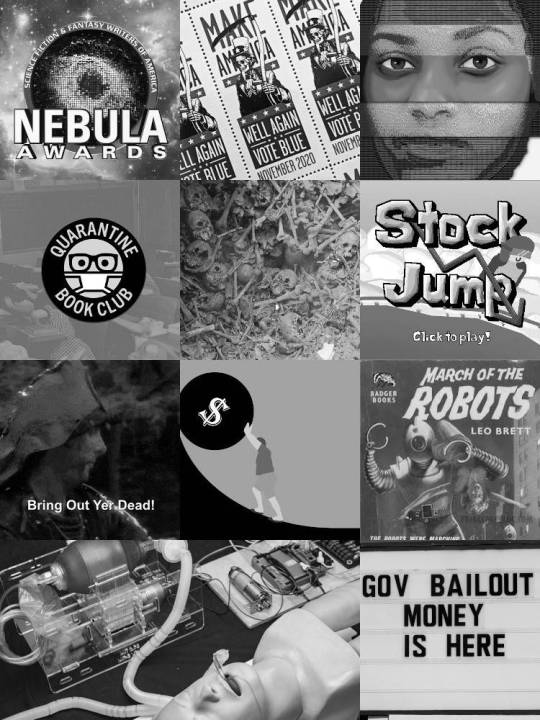
Today's links
This year's Nebula Awards will be held online: It's $150, and raising funds to bail out corona-shattered writers.
Make America Well Again stamps: from the artist who brought you the Trump Zero Cents stamp.
Data is the new toxic waste: It never was the "new oil" (my latest podcast).
Stock Jump: A ski-game that lets you play the stock charts of cratered businesses.
Murdering 20% of elderly Americans is bad strategy for the GOP: Terrified old people are the turkeys who vote for plutes' Christmas every four years.
Join me on the Quarantine Book Club: April 1, 3PM Pacific.
The Party of Death: It's a good time to buy exterminism futures.
Financial stability vs economic stability: Debts that can't be paid, won't be paid.
Quarantine reveals the falsity of the automation crisis: Augmentation isn't replacement.
Bailouts and moral hazard: If we never teach big business, it won't ever learn.
MIT's ingenious manual/automatic open source ventilator: Now in FDA testing.
This day in history: 2005, 2010, 2015, 2019
Colophon: Recent publications, current writing projects, upcoming appearances, current reading

This year's Nebula Awards will be held online (permalink)
This year's Nebula Awards weekend is moving online, thanks to decisive action from SFWA and Mary Robinette Kowal.
https://www.sfwa.org/2020/03/22/announcing-the-transformation-of-the-2020-nebula-conference-and-covid19-relief/
It'll include "panels, solo presentations, conference mentorships, workshops, forums, chats, and virtual room parties (including a dance party hosted by John Scalzi)." Part of the proceeds will go to relief for sf writers who are in covid-related financial distress.
It runs May 29-31, including a livestream of the Nebula Awards banquet. Registration is $150 and comes with a year of access to archived materials and the SFWA Bulletin.

Make America Well Again stamps (permalink)
I bought some of Ben Hannam's Trump No Cents stamps in 2017 and never looked back. I still put 'em on letters.

Now he's got a Make America Well Again stamp, which you can lick (if you dare) and stick for the duration. Remember, USPS is profitable and unsubsidized and Trump's swamp-dwellers want to shut it down and replace it with donors like Fedex and UPS!
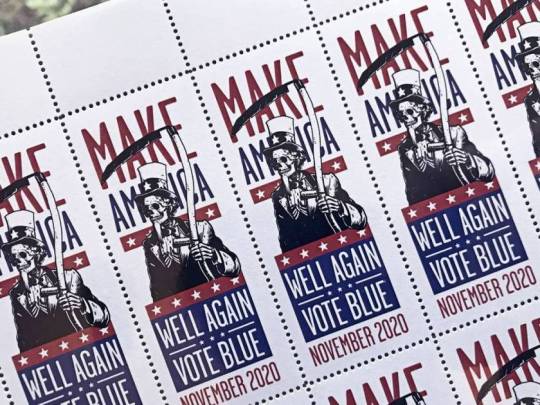

Data is the new toxic waste (permalink)
My latest podcast is a reading of "Data – the new oil, or potential for a toxic oil spill?" — a column arguing that data was never "the new oil" – instead, it was always the new toxic waste: "pluripotent, immortal – and impossible to contain."
https://www.kaspersky.com/blog/secure-futures-magazine/data-new-toxic-waste/34184/
Data breaches are inevitable (any data you collect will probably leak; any data you retain will definitely leak) and cumulative (your company's data breach can be combined with each subsequent attack to revictimize your customers).
Identity thieves benefit enormously from cheap storage, and they collect, store and recombine every scrap of leaked data. Merging multiple data sets allows for reidentification of "anonymized" data, and it's impossible to predict which sets will leak in the future.
These nondeterministic harms have so far protected data-collectors from liability, but that can't last. Toxic waste also has nondeterministic harms (we never know which bit of effluent will kill which person), but we still punish firms that leak it.
Waiting until the laws change to purge your data is a bad bet – by then, it may be too late. All the data your company collects and retains represents an unquantifiable, potentially unlimited source of downstream liability.
What's more, you probably aren't doing anything useful with it. The companies that make the most grandiose claims about data analytics are either selling analytics or data (or both). These claims are sales literature, not peer-reviewed citations to empirical research.
Data is cheap to collect and store – if you don't have to pay for the chaos it sows when it leaks. And some day, we will make data-hoarders pay.
Here's the podcast:
https://craphound.com/podcast/2020/03/23/data-the-new-oil-or-potential-for-a-toxic-oil-spill/
Here's the MP3:
https://ia801406.us.archive.org/9/items/Cory_Doctorow_Podcast_334/Cory_Doctorow_Podcast_334_-Data-_the_new_oil_or_potential_for_a_toxic_oil_spill.mp3
And here's the link to subscribe to the podcast:
http://feeds.feedburner.com/doctorow_podcast
Stock Jump

Stock Jump (permalink)
Last week, those of us lucky enough to have retirement savings joined the rest of the world, because our 401(k)s all cratered and all the promising stocks (teleconferencing, guillotines) are all way, way overpriced thanks to panic buying by Republican Senators.
But when life gives you SARS, you make sarsaparilla.
Enter Stock Jump, a ski-jump game whose courses are procedurally generated by the stock charts of shares from around the world.
It's really fun! If you can see through the tears.
http://stockjump.sos.gd/

Murdering 20% of elderly Americans is bad strategy for the GOP (permalink)
A thread by Patrick Nielsen Hayden on Making Light crystallized a thought that literally had me tossing and turning all night, about Trump's decision to risk the lives of ~20% of elderly Americans to goose the stock market.
https://nielsenhayden.com/makinglight/archives/016643.html#4402672
The thing I find baffling is how short-term this thinking is.
Not for Trump, of course, who is legendary for his view of life as a game of running across a river hopping from the back of one alligator to another before he can get his leg bitten off.
But for the right-wing establishment, whose whole schtick is "rationality" and "long-term thinking" and "self-control" (think of the gleeful repetition of the discredited Marshmellow Test and the rhetoric about the "poor life choices" that lead to single parenthood, addiction, and inadequate retirement savings or health insurance).
How is it that these self-congratulatory long-game-players can't see that murdering one in five American seniors is a self-limiting move when frightened old white people are the primary source of turkeys who can be counted upon to vote for Christmas every four years?
The right has an antimajoritarian, elitist agenda. Right-wing thought is essentially the belief that some people are destined to rule, and others are destined to be ruled over by their betters, and the world is best when the right people are atop the pyramid. Splits in the right are about who should rule: Dominionists want Christian men in charge; libertarians want bosses in charge, imperialists want America in charge, racists want white people in charge, etc.
Antimajoritarian projects struggle in democracies, for obvious reasons. When your platform is "only 1% of us should be making decisions" it's hard to win 51% of the vote. That's why the right focuses so hard on gerrymandering and voter suppression, and why the otherwise untenable coalitions — finaciers and young-Earth Creationists, say — persist.
But the biggest source of ballots in support of rule by elites is frightened people, especially frightened bigots who think that the elites will promote their interests ahead of the disfavored minorities (think: Dixiecrats).
So murdering 20% of the most reliable source of votes for elite rule is a farcically shortsighted thing to do.
I am terrified of a Biden candidacy not merely because I think his policies are poor, but because I think he is really bad at being a candidate, and will struggle to win.
But Trump murdering 20% of his base might just be enough to make him lose. It may be that while he could murder someone in the middle of 5th Ave and get away with it, he can't sentence 20% of US pensioners to gruesome deaths and get away with it.
I'm not gleeful at this prospect. I am totally aghast. I barely slept last night, waking up dozens of times with this genocide playing out in my imagination.
But I am incredibly surprised. How does the self-declared Party of the Long View not see that this is going to destroy it?
The stock market is circling the drain and obviously this is very distressing for the donor class, but almost no Americans own any significant stocks, because most Americans have NO savings. The idea that rescuing share prices by killing the elderly will get the turkeys out to vote for Christmas is clearly wrong.
For more on antimajoritarianism and the right, read Corey Robin's outstanding book, "The Reactionary Mind."
https://twitter.com/doctorow/status/1234117673316782082

Join me on the Quarantine Book Club (permalink)
I'm going participate in a session of the Quarantine Book Club on April 1 at 3PM Pacific, where we're discussing my book Radicalized. Tickets here:
https://www.eventbrite.com/e/quarantine-book-club-cory-doctorow-tickets-100931360416
If $5 is a burden for you, you can get in free with the code ALLAREWELCOME.
Hope to see you!
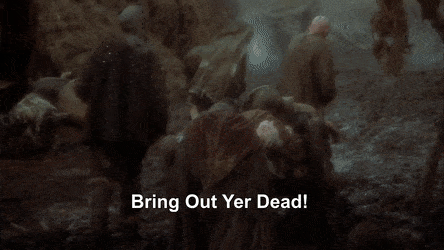
The Party of Death (permalink)
In his 2017 book Four Futures, Peter Frase uses science fiction to sketch out four ways our society could go as capitalism ruptures, from communism to exterminism, this being the expression of bosses' fear and dependence on workers.
https://boingboing.net/2017/01/06/four-futures-using-science-fi.html
Frase posits a possible mass-automation event that makes workers superfluous (I'm skeptical of this: climate change guarantees 2-3 centuries of full employment, e.g., relocating every coastal city).
But in light of the Current Situation, he imagines a different form of exterminism.
https://jacobinmag.com/2020/03/coronavirus-economy-public-health-exterminism/
It's not just the GOP's willingness to murder 20% of seniors in the hopes of rescuing the Dow.
Plutes and their bootlickers have been calling for mass-deaths as a preferable alternative since the crisis first manifested, as when Tea Party founder Rick Santelli suggested "Maybe we'd be just better off if we gave it to everybody."
And of course, there was Boris Johnson and Dominick Cummings' plan to infect all of the UK to create "herd immunity." As Cummings said, "if that means some pensioners die, too bad."
Now Trump wants to potentially murder 20% of American seniors to rescue share prices, and the GOP is going along with him.
https://twitter.com/doctorow/status/1242444277264740353
The Republicans have become the Party of Death, with establishment figures like Thomas Friedman providing ideological cover (""let many of us get the coronavirus, recover and get back to work").
https://www.nytimes.com/2020/03/22/opinion/coronavirus-economy.html
Frase: "The ghoulishness of this strategy will become apparent when it is too late, when the hospitals fill and the health care system and the economy both collapse."
"Those in power will be held blameless, and those with wealth will sadly lament the foolishness of the lesser orders."
"Socialists have always insisted that human needs should take precedence over profit, that the stock market is not the economy, and that we need to utterly transform an economy that is immiserating working people and destroying the planet. That message will only become more urgent as our opponents across different parts of the ruling class come to the conclusion — mournfully for some, gleefully for others — that in the contest between loss of profit and loss of life, they choose death."

Financial stability vs economic stability (permalink)
Michael Hudson is a fascinating thinker, an expert in the history of debt and debt-forgiveness. See, e.g., this:
https://pluralistic.net/2020/03/23/tacocat-vs-dog-prostates/#jubilee
In a new interview, Hudson delves into that history: interest-bearing debt was invented in the third millennium BCE, and quickly kings learned that they had to have periodic debt forgiveness, or compound interest would render all debts unpayable.
https://digitalfinanceanalytics.com/blog/debt-and-power-with-michael-hudson/
Greeks and Romans did away with the practice, and so had to live with six centuries of debt-revolts, as ever-larger fractions of their populace ended up in a form of debt slavery.
Greek Democracy was created to allow commoners to serve in government and so vote to cancel debts. Roman emperors conquered Greece and did away with debt-cancellation, creating an increasingly unstable oligarchy.
That's not far off from where we are today. 90% of debts are held by the richest 10%, and these oligarchs own the political process and refuse to countenance debt-cancellation.
Obama promised to write down mortgages, but instead he bailed out finance, who kicked us all out and bought our houses out from under us, and then rented back to us. Since then, the Fed "has created $4.5 trillion of credit to support prices for real estate."
"The aim has been to make housing more expensive, enabling the banks to collect on their mortgages and not go under. Credit keeps the debt overhead in place, thereby keeping the financial system afloat instead of facing the reality that debt needs to be written down."
Trump's gonna do it again, giving $50b to airlines/Boeing. Since 2008, Boeing has spent $45b on buybacks. Trump's message: "Spend 92-95% of your income to buy your own hares, and the government will print money so you can do it again, because our priority is stock prices."
"Financial stability" is incompatible with "economic stability." Financial stability means never writing down debts so that the bad loans oligarchs made never turn into bad debts. Economic stability requires debt write-downs so that people can be productive.
Obama's bailouts increased big banks' Too Big to Fail status. That's why since 2008, "GDP per 95 percent of the American population is actually shrunk. All the growth in America's GDP has occurred only to the wealthiest 5% of the population."
Today, plutes "hope to use the crisis not to revive the economy, but to just pound it into debt deflation, leaving the debts in place while bailing out the banks and the landlord class."
Here's what "financial stability" looks like: "you have to pay this exponential growth in debt, [and] have less and less to buy goods and services."
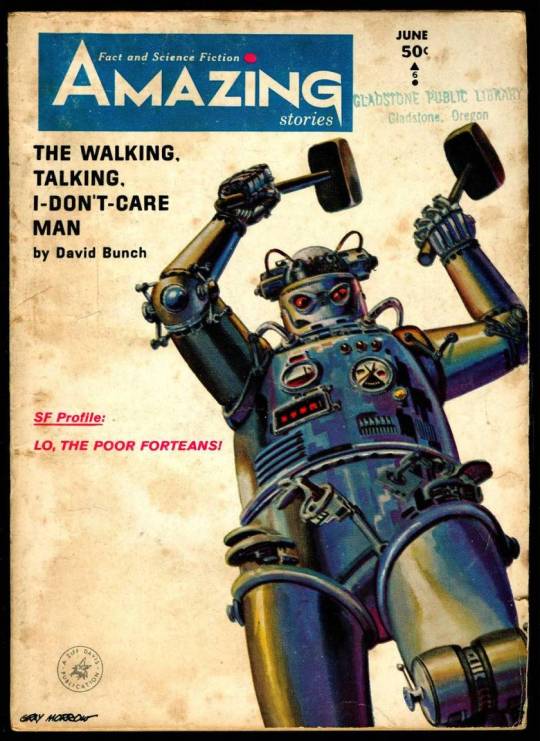
Quarantine reveals the falsity of the automation crisis (permalink)
Automation-based unemployment has always been overhyped. Any work that robots take over merely frees up human workers for the 2-300 year project of climate remediation, including relocating every coastal city in the world.
But automation is also vastly overhyped. Take the oft-repeated claim that "truck driver" is the most common job in America, and first in line to be automated. It's just wrong.
First, because the BLS "truck driver" category includes long-haul truckers, delivery drivers, couriers, and dozens of other subprofessions, most of which are far, far away from being automatable.
https://hbr.org/2019/09/automation-isnt-about-to-make-truckers-obsolete
(More importantly, though: the most automatable category is long-haul driver, and an automated long-haul truck in its own dedicated lane is just a shitty train).
The overhyped nature of technological displacement is on perfect display during the pandemic quarantine. As many "low skilled" (which is to say, "low waged") workers withdraw from the workforce, the economy has ground to a halt.
So much so that the right is now prepared to throw 20+% of seniors into the volcano to appease the market gods.
The category error committed by automation-fretters is to confuse "automating a job" with "augmenting a worker."
"We know that robots are great at repetitive work. they can do that forever. What's not so great is anything with a human-centered context, a cultural context." -Julie Carpenter
https://www.wired.com/story/robot-jobs-coronavirus/
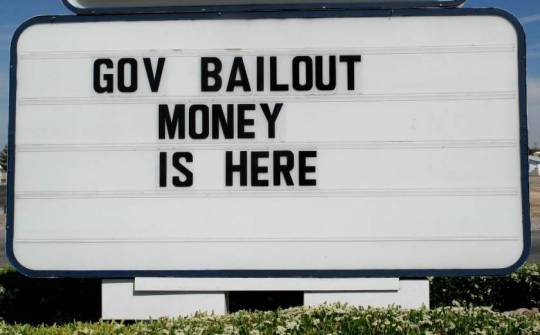
Bailouts and moral hazard (permalink)
It's been barely a decade since the USG bailed out big businesses and the fact that we're here again reveals some of the glaring failures in the last bailout. Any new bailout should correct those errors by putting restrictions on bailed-out companies.
https://pluralistic.net/2020/03/19/gb-whatsapp/#peoples-bailout
There have been some good proposals on these lines, like those from AOC and Stephanie Kelton:
https://pluralistic.net/2020/03/21/most-dangerous-ghost/#peoples-bailout
(whenever I write about this in public, I'm inundated with angry tweets from sociopaths with "investor" in their bios)
We're running out of time to get this right. DC is so filled with money-hungry lobbyists that they can't practice adequate social distancing, and they're collectively seeking trillions in string-free public money for their paymaster.
https://www.ineteconomics.org/perspectives/blog/rule-number-1-for-government-bailouts-of-companies-make-sure-voters-and-taxpayers-share-in-the-upside
At a minimum, any bailouts should come in exchange for convertible corporate bonds that let the USG take an ownership stake in any business that fails to repay its public debts. That's a minimum, as is a ban on stock buybacks for bailed out companies.
We need very strict limits on lobbying by bailed out firms: "If we are not to finance our own bamboozlement, any company receiving bailouts must be required each month to file full reports on political contributions and lobbying expenditures to candidates and parties."
This goes for dark money contributions, including 527 funds, and corporate/exec contributions to trade associations and other lobbying fronts, think-tanks, and other political influence vehicles.
"Unlike last time, when Hank Paulson, Tim Geithner, and Ben Bernanke failed to give the public a serious share of the upside, the bailed out firms should be compelled to issue convertible bonds to the government."
"Those bonds should make the government the senior creditor to the firm for the value of the principal as long as the debt is unpaid…As firms and the economy recover, the shares can be sold on the open market, yielding a handsome return to the Treasury."
The right likes to harp about "moral hazard" as an excuse for cutting aid, to, say, single mothers ("It only encourages them"). But what about businesses that needed trillions in 2008 and now need trillions more? What lesson are we teaching them?
(Image: Alex Proimos, CC BY)

MIT's ingenious manual/automatic open source ventilator (permalink)
At the end of last week, a crowdsourced design for an open-source hardware ventilator entered testing with the Irish regulator, a week after work began on the project.
https://pluralistic.net/2020/03/20/pluralistic-20-mar-2020/#oshw-breathing
Now, hot on its heels, an MIT open source hardware ventilator team has submitted its design to the FDA for testing and approval, under the Emergency Use Authorization (EUA) authority.
https://e-vent.mit.edu/
It eliminates many possible sources of failure by replacing an electric pump with a manual one, which can, in turn, be operated by a separate, very simple, Arduino-controlled system (which can be readily swapped out for a human hand if it fails).
As Hackaday points out, "Almost as interesting as the device itself is the comments people are leaving about the design."
https://hackaday.com/2020/03/23/mit-ventilator-designed-with-common-manual-resuscitator-submitted-for-fda-testing/

This day in history (permalink)
#15yrsago Record sales up, P2P sales up — RIAA's story doesn't add up https://web.archive.org/web/20050822053404/http://news.com.com/2100-1027_3-5631698.html
#15yrsago Octopuses dressed up as sea coconuts sneaking on two legs https://www.nature.com/news/2005/050321/full/050321-14.html
#10yrsago Pooh vs Alien: Webcomics realize their full potential at last http://godxiliary.com/alienvspooh/
#10yrsago Airport worker caught photographing screen as female worker passed through naked scanner https://www.theguardian.com/uk/2010/mar/24/airport-worker-warned-body-scanner
#10yrsago UK record lobby: democracy is a waste of time https://www.openrightsgroup.org/blog/2010/corporate-lobbyists-no-need-for-democracy
#5yrsago How medical abortion works https://www.ohjoysextoy.com/medical-abortion/
#5yrsago ACLU sues TSA to make it explain junk science "behavioral detection" program https://www.aclu.org/press-releases/nyclu-and-aclu-sue-tsa-records-discredited-behavior-detection-program
#5yrsago Randomized dystopia generator that goes beyond the Bill of Rights https://www.harihareswara.net/dystopia/
#1yrago Man stole $122m from Facebook and Google by sending them random bills, which the companies dutifully paid https://www.bleepingcomputer.com/news/security/lithuanian-pleads-guilty-to-stealing-100-million-from-google-facebook/
#1yrago Chelsea Manning is being held in prolonged solitary confinement, a form of torture https://xychelsea.is/?page_id=28

Colophon (permalink)
Today's top sources: Tor.com (https://tor.com), Naked Capitalism (https://nakedcapitalism.com/), Slashdot (https://slashdot.org/).
Currently writing: I'm getting geared up to start work my next novel, "The Lost Cause," a post-GND novel about truth and reconciliation.
Currently reading: Just started Lauren Beukes's forthcoming Afterland: it's Y the Last Man plus plus, and two chapters in, it's amazeballs. Last month, I finished Andrea Bernstein's "American Oligarchs"; it's a magnificent history of the Kushner and Trump families, showing how they cheated, stole and lied their way into power. I'm getting really into Anna Weiner's memoir about tech, "Uncanny Valley." I just loaded Matt Stoller's "Goliath" onto my underwater MP3 player and I'm listening to it as I swim laps.
Latest podcast: Data – the new oil, or potential for a toxic oil spill? https://craphound.com/podcast/2020/03/23/data-the-new-oil-or-potential-for-a-toxic-oil-spill/
Upcoming appearances:
Quarantine Book Club, April 1, 3PM Pacific https://www.eventbrite.com/e/quarantine-book-club-cory-doctorow-tickets-100931360416
Museums and the Web, April 2, 12PM-3PM Pacific https://mw20.museweb.net/
Upcoming books: "Poesy the Monster Slayer" (Jul 2020), a picture book about monsters, bedtime, gender, and kicking ass. Pre-order here: https://us.macmillan.com/books/9781626723627?utm_source=socialmedia&utm_medium=socialpost&utm_term=na-poesycorypreorder&utm_content=na-preorder-buynow&utm_campaign=9781626723627
(we're having a launch for it in Burbank on July 11 at Dark Delicacies and you can get me AND Poesy to sign it and Dark Del will ship it to the monster kids in your life in time for the release date).
"Attack Surface": The third Little Brother book, Oct 20, 2020. https://us.macmillan.com/books/9781250757531
"Little Brother/Homeland": A reissue omnibus edition with a new introduction by Edward Snowden: https://us.macmillan.com/books/9781250774583
36 notes
·
View notes
Text
The Democrats need a new national symbol. The Republicans have the elephant, a majestic and wise and noble creature. Democrats have a donkey, which was originally meant as an insult; political opponents of Andrew Jackson (American Hitler) called him Andrew Jackass, and he turned it around on them by adopting a jackass as the symbol of his party. Oh sure, in the 1800s you could argue that a jackass was stubborn and strong willed, but then as now you will eventually come to the conclusion that donkeys are just not bright animals. Being called an Elephant is great! Being called a Donkey is not so great.
There are so many better animals attributed to the United States; I say we adopt one of them. I think the bald eagle is off limits for parties, so maybe something like an American bison, or a mountain lion, or an alligator (if you’re from down south). The American black bear, or the Grizzly if we can get some support from Alaska or Montana (not exactly Democratic strongholds). Raccoons are cute, but I think a party mascot needs to be a bit intimidating. So that’s why I propose we bring back the Bull Moose!
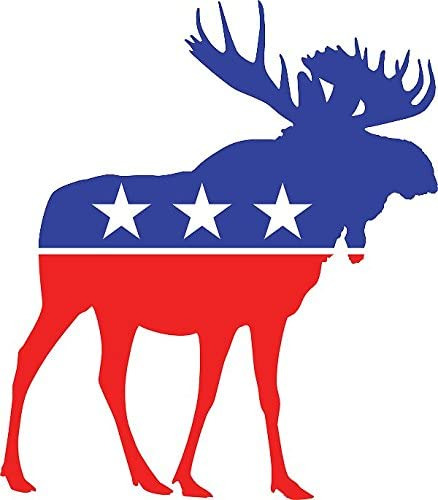
Bull Moose Party, the Progressives, formed in 1912 when former President Teddy Roosevelt (1901 - 1909) decided to run for a third term. It was a left-wing party, dedicated to the protection of human welfare first and foremost. It fought for 8-hour work days, workers compensation, and minimum wage laws. It fought for women’s suffrage, the direct election of senators (who until 1913, were appointed by their state legislatures instead). It sought to bust trusts and break up monopolies; it was reformist, it sought to modernize the state, regulating big corporations and PACs to fight corruption. Conservationism, environmentalism, social justice, healthcare and wall street reforms; all the quote-unquote “pie-in-the-sky” dreams that Republicans and Moderates pretend we can’t have!
I’m not saying we go back to 1912; they had eugenics and shit. I’m just saying we adopt the symbolism because of how strongly it is tied to Teddy Roosevelt. Yeah, he was a Republican, but back in the day that was the northern liberal party. He created the National Monuments and National Parks people know and love, he’s a manly man, he’s got machismo, he’s the kind of guy voters could just sit down and have a beer with, shoot the shit. He could play to the salt of the Earth like he’s one of them, regardless of his affluent family. That’s the energy we need, the confidence, the big personality that everyone loves. Never meet your heroes, they’ll always disappoint; look long enough and you’ll find skeletons hidden in every politician’s closet. Teddy by no means had a clean track record, but the average American doesn’t know that. They just know him as a war hero and a diplomat; he led the rough riders up San Juan Hill, he spoke softly and carried a big stick, his face has been carved onto a honking mountain! We need to use this to our advantage,
Adopt the Bull Moose as the symbol of the Democratic Party, and integrate some (but not all) of Roosevelt’s progressive talking points into the modern party platform. Let Republicans squeal about how we can’t have him because he’s their’s, who gives a shit? We’ll trade them Andrew Jackson, they like him, they can have him, but we’re taking Teddy Roosevelt. For that matter, we could take Abraham Lincoln; the Party of Lincoln is NOT the same as the Party of Reagan, they are mutually exclusive, they had none of the same ideologies, they just used the same name for their political cool kids club is all. We don’t have any cool Democrats. Wilson is boring, FDR comes close, beloved by pretty much everyone, but he’s not as bombastic as his fifth cousin once removed Teddy (yes, that’s how they’re related). Truman was boring. Kennedy was cool, but got shot halfway through his first term, so we have no idea what he would actually be like. Johnson was a drunken warmonger from the south. Carter was an ineffective peanut farmer from the south. Clinton was a pervert from the south. I think it’s clear the south doesn’t give us good presidents. Obama, you either love him or you hate him. I’m on the fence because I WANT to love him, but I know how the sausage gets made, I know he’s just as guilty as any other president that’s sat in that office, so it doesn’t make sense to idolize these very flawed people. My point is, the Roosevelts sell. If we pitch Franklin and Teddy together, we get the good cop/bad cop dynamic, fire and ice, two of the most beloved presidents in American history united under one common banner to our advantage.
That’s how we can sell the Green New Deal; talk about the Great Depression, World War II, FDR’s policies pulling us back from the brink and onwards and upwards to the most prosperous and dynamic economy the US has ever had, before or since. We can do good business without having to shit on the environment and the little people. A Bull Moose Progressive coalition in 2020, 2022, 2024, I think could do wonders for this country. It could be like a left-wing Tea Party. We need to toughen up, we need to stop acting like failures and start acting like winners! Ditch the Donkey. Moose mean business, they’ll fuck you up. A moose is big enough that it could actually go toe-to-toe with an African bush elephant; with those antlers, it could do some serious damage. Give us a symbol that can hold its own; political cartoonists would have a field day with that one!
#democrats#democratic party#democrat#democratic#donkey#democratic donkey#jackass#bull moose#bull moose party#progressive party#franklin roosevelt#teddy roosevelt#roosevelt#president roosevelt#fdr#teddy#bull moose progressive#party symbols#liberals#leftists#progressives#coalition#food for thought#politics#political#rant#political rant
14 notes
·
View notes
Text
Ywsterday (sunday february 14th of 2021) there was an election in Catalonia and I feel like talking about it so I'm gonna explain it briefly (a brief explanation, a long post mayne 10 or 15 min read) for my American & international readers out there. (This will have a clear bias, I'm no journalist. That said, I don't belong to any of the parties discussed in this post.)
First, a bit of context for those completely unaware. Catalonia is a historical region of Spain with its own language (which has been marginalized and banned to various degrees during the last 3 centuries, which stirs controbersy to this day) and a separatist movement that has had moments of relevance and irrelevance along the last ~100 years.

Independence as a social movement has had its ups and downs, 25 years ago it wasn't very relevant but in the 2010s it started gainign traction ending in an unsuccessful unilateral declaration of independence in 2017 which resulted in the arrest or exile of most of the government (President Puigdemont is exiled in Waterloo, vice president Junqueras has spent years in prison now).
With that out of the way, to talk about the players in this election first we have to understand how does one get to be president of Catalunya.
Catalunya, as well as Spain as a whole and many other european countries and regions, doesn't have Presidential elections, they only vote for the parliament members: voters choose a party and once the Parliament is made up they vote for the president. In this particular case, the Parliament has 135 seats so if some party gets 68 seats they have an absolute majority and can govern by themselves in most cases (some things require 2/3 majority but to elect a president and to pass most laws it's just half+1).

The thing is, this election the winner didn't get anywhere near 68 seats, they got 33 so whoever ends up governing needs to pact. It's time to know the players:
To start, we're going to talk about the parties in the previous, independentist government:
THE INDEPENEDENTIST FORCES:
Junts per Catalunya (together for Catalunya) is a big, centrist coalition of organisations with left leaning and right leaning sectors. The left sees them as right wing and they're the only catalanist right wingers, so the rest of the right fucking hate their guts. They were in power for decades (under the name Convergència i Unió, the history of this party is convoluted) since the end of the fascist regime and did a lot of work to reestablish the place and institutions of the Catalan language (Franco was infamously against any languages in Spain that weren't Spanish). This is the party that the exiled president Puigdemont belongs to. Of the main 2 parties in power this was the bigger one until last night.
Esquerra Republicana de Catalunya (ERC, Republican Left of Catalunya, republican as in opposed to monarchy): Left wing, cataln nationalist run-of-the-mill european social democrats. They defend the catalan culture and language as JxC has done, they were in power as a part of the "tri partit" (three parties) with other left wing forces from 2003 to 2010 to avoid more years of JxC government. Then, independentist movement started to gain traction, the more conservative faction of JxC left and they (JxC & ERC) formed a government together with the complicit votes of CUP.
CUP (Candidatura d'Unitat Popular, Candidature of Popular Unity) is a far-left, socialist, quasi-anarchist organisation that used to have a few members of local councils but didn't even bother going to Catalan elections, then independence happened and have had a few MPs ever since. Not enough to pass any radical laws, but enough so that the JxC and ERC coalition needs their votes to govern: they vetoed Artur Mas, an infamously corrupt president and actually got what they wanted.
~
ELS COMUNS (the commons?) is neither independentist or unionist, they're a left wing party (less radical than CUP but also with less relevance and votes in the general Catalan panorama, although they have the Mayor of Barcelona). They try to pass progressive left leaning legislature and even though some of them want independence, they don't believe it's a pressing issue for the catalan people. Their Spanish Counterparts, Podemos, are in power as the 2nd, more "radical", left leaning force of a center-left coalition in the Spanish governent with PSOE.
~
THE UNIONISTS:
PSC (Partit dels Socialistes de Catalunya, Socialists' Party of Catalunya) is the Catalun branch of PSOE (socialists etc etc español), a center-left party that is currently in the Spanish government. PSC used to have catalanist sectors and when they were in power in Catalunya (as the 1st force of the Tripartit) they passed laws to defend catalan etc (to this day since the death of Franco no regional government of Catalonia has been against defending Catalan). Those positions towards the language and culture probably remain but now they're explicitly anti independence. They're not super left but if you don't count Comuns as unionists, PSC is the farthest left you can go in the unionist side.
PP: the strong Spanish right wing party since the 90s, where all the francoists ended up after the transition in the 70s, they held the Spanish governent '96-2004 and 2011-2018 and do not want to defend catalan. They won't usually say it out right though, they'll say things like "spanish speakers are oppresed in Catalunya", and that's the same for all anti-independentists. In Catalonia, though, they have very bad results.
Ciudadanos (citizens) is basically a split from PP that formed in 2006 in Catalonia to be explicitly anti-catalanist. For a hot second it seemed like they could be the new strong party of the Spanish right but now the party is crumbling and in Catalunya specifically they've gone from 1st force (they still didn't govern) with 36 seats to second to last with only 6. Rumours say that the party will dissolve before the next election.
Vox is a far right party that likes Donald Trump and fucking hates independence and Catalunya, they're a new party and rn the strongest of the spanish right wing forces in Catalunya in 4th place in the parliament.
Now you know all the players I can explain THE RESULTS:
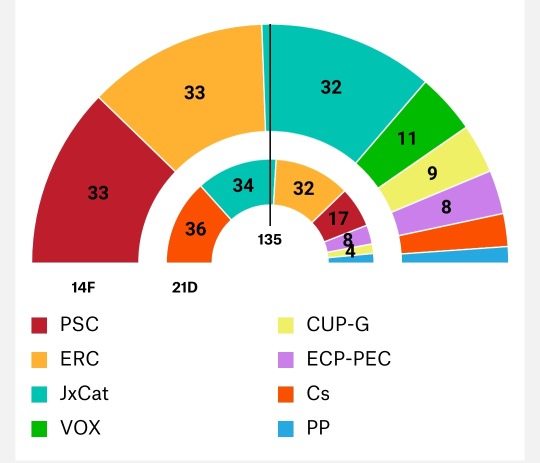
(the big hemicircle is yesterday's results, the little one is last election's)
PSC has had a slight edge over ERC but they haven't been able to reflect that in more seats. Cs has crumbled from first place to 8th. Vox has appeared out of nowhere, but the rise in unionist seats (26) between PSC and Vox is still smaller than the 30 seats Cs has lost.
In the independentist side, ERC has gained 1 seat, JxC lost 2 and CUP gained 5 for a total gain of 4 seats for the independentists.
Even thoug an explicitly far right force has entered the parliament, this election shows a trend towards left wing forces: unionists towards PSC rather than Cs, and independentist towards ERC and CUP.
Even though the JxC+ERC coalition is a mess, all analysts and journalists agree that ERC's Pere Aragonès has the best chance to become the next President. All evidence points to the fact that CUP will have an easier time voting for a leftist President from ERC than a centrist/right winger from JxC, and some rumours say that ERC could be looking for Comuns' support. They don't want independence but maybe they can be brought in to strengthen the left wing stance of this new government.
The opinions of analysts and the rumours I mention come from last night's TV3 election special.
Election results:
If you've read the whole thing thank you and I hope this has been useful 😊❤️
1 note
·
View note
Text
a post about the Democratic primary, which I did not enjoy writing
I haven’t talked about the Democratic primary here for a couple of reasons. I think that wrapping our minds about what Trump is doing in power – and what he and his backers did to get him that power – is a lot more important than any campaign tactic his eventual Democratic opponent can use, or even who the Democratic candidate is. I don’t even know who I’ll be voting for myself.
What I do know is that above all other issues, I’ll be voting on democratic values. That includes more conventional voting rights and election integrity issues that we’re used to discussing in American politics. It’s also about pounding the brakes on democratic backsliding at home, and giving institutional and moral support to people around the world who want the same. If we make enough progress on this issue, we can make enormous strides on other progressive priorities. If we don’t turn back this authoritarian tide, we will lose on everything else.
And on my #1 issue, I’ve developed serious concerns about Senator Bernie Sanders.
This is a long post because it’s an attempt to articulate an uncomfortable pattern which requires a lot of context, but I hope you’ll take the time to read it, so let me assure you of a few things it’s not:
Concerns about Sanders seem to be collapsed into “is he as extreme and irrational a leftist as Trump is a right-winger” or “is he too kooky to win an election.” I’m not doing either of those. There is an argument out there that Sanders is too far to the left on policy. I’m … really not the person to do that argument justice. There’s an argument that, whether or not you like his policies, he would have a harder time winning a national election in a year that Democrats cannot afford any more disadvantages. I think this election really is going to be won or lost by the voters choosing to accept or reject Trumpistani autocracy, but it’s entirely responsible to consider that kind of thing. I have a substantive concern about Bernie Sanders, not because I oppose progressives but because I am a progressive, and I don’t pretend to have any insight into how it might affect his chances of winning a general election.
I don’t care a whole lot about what Senator Sanders feels in his heart or whatever. I tend to think this is more about being misguided than malicious, but that’s not make or break for the pattern I’m trying to describe.
I’m not trying to endorse someone else by process of elimination; like I said, I haven’t decided yet who I’m voting for myself.
I’m old enough to remember four years ago when only a few nerds had ever heard of superdelegates. Superdelegates, or unpledged delegates, are party activists and officials who get to vote at the convention along with the pledged delegates who are assigned in the state primary contests. They’re the backup plan put in place after the clusterfuck of 1968. We also got better at avoiding clusterfucks after 1968, so they weren’t an issue. Until 2016, when Sanders decided they were an issue for him because he was going to lose the old-fashioned way, and “superdelegates” were a convenient boogeyman he could use to turn progressives against the Democratic party. Then his campaign successfully talked itself into believing that this conspiracy theory about superdelegates going against the voters, so they started arguing that the superdelegates should take the nomination away from the winner and give it to him. This was always a pipe dream, but it did inspire Sanders supporters to dox a bunch of counterrevolutionary elected officials and progressive activists. Remember, he’s a member of the Senate Democratic caucus, so he’s talking all this shit as a superdelegate.

The sore losering only helped Donald Trump and his Russian backers, but it was delegitimizing enough that the Democratic National Committee felt pressured to revamp the presidential nomination process. Thus, a “unity” committee was formed to placate the feelings of those who were implacably infuriated that the person with the most votes had won the nomination. (The Republicans, whose party processes had allowed an unqualified, unstable, ideologically unreliable foreign asset to take over, made no such alterations.) The big concession on superdelegates is that they don’t vote on the first ballot. If someone wins a majority, then they win the nomination. If nobody gets a majority, then there’s a second vote where the pledged delegates are released and the superdelegates also get a say.
Presumably because pro-Sanders activists were so instrumental in drafting the new rules, they were all set to start gaming those rules before voting began. In early January, when it was assumed that former Vice President Biden would win more delegates than anyone else but come up short of a majority, groups supporting Sanders floated the idea that Warren’s delegates should be ready to join Sanders, or vice versa. The reasoning was that a vote for Warren or Sanders should be considered a vote for what they considered the relatively progressive wing of the Democratic party, and therefore pooling the two candidate’s votes together would represent the will of the electorate. Six weeks later, with Sanders having eked out a plurality in a few early states – more delegates than anyone else, but nowhere near a majority, and losing the popular vote – he’s out here warning that it would be very, very bad for everybody if the person who wins the plurality isn’t guaranteed to win the nomination. If 66% of voters split between two “establishment” candidates, well, that 34% who voted for the “anti-establishment” Sanders better get their way, or the party gets it!1
Sanders representatives also insisted states be allowed to keep holding undemocratic caucuses – until he was outplayed in the Iowa delegate count, at which point they realized the establishment $hills had been right about voter suppression being bad.
Look, real talk, small-d democracy is about trying to do what the voters want. If Sanders stays exactly where he is in the polls – winning a plurality of delegates with only about 1/3 of the voters – he will be getting a lot less support than he did in 2016. When he lost by a whopping 12-point margin, despite being propped up by the Kremlin, the Koch brothers, and thousands of years of patriarchy. If these trends hold (and they might not!) Democratic voters, who are the voters most likely to support his policies, do not want him. So – and I’m editorializing a little bit in this final assessment – spare me.
America is a big country and the Democratic Party is a broad coalition. There are going to be good arguments for and against a lot of different ways to pick a presidential nominee, but a key part of doing it as fairly as possible is to choose the rules beforehand and then stick to them. Campaigns making the best case for their candidate isn’t a bad thing, and a politician being able to change their mind is a good thing. But Sanders whips his supporters up with sweeping claims about the legitimacy of the process – until the opposite claim looks like it might be advantageous to him, at which point his campaign completely reverses itself on whether or not the rules of the election are fair. This is not acceptable. We cannot be playing this game when we are trying to defend the legitimacy of democracy itself against the most powerful person in the world.
On its own, I’d find that frustrating. But once a frustration starts overlapping with a genuine national security issue, it stops being a frustration and starts being a serious concern.
Senator Sanders was informed a month before the Nevada caucuses that the Russian government was supporting his campaign. Again. We still don’t know what kind of support they were giving him, though it’s probably more or less what they were doing in 2016 – pushing propaganda and making it harder for people to have productive discussions about the primary. He didn’t say anything about it, except to obliquely reference Russian trolls when he was challenged on the debate stage about some of his supporters being abusive online. (We’ll come back to that one.)
When this story broke, as it clearly would, Sanders reacted by attacking the newspaper. He claimed that the briefing his campaign received was classified, which a) it is unlikely to have been properly classified, which he would’ve known if he’d tried to work out a way to go public and b) didn’t stop him from using some of that information to his advantage during a debate. His campaign went around crowing about these great victories where he squeaked out pluralities knowing that those victories were tainted by a foreign government helping him and/or sabotaging his competitors. (Meanwhile, these competitors were not even told that they were at risk.)
He responded similarly to the Russian support he received in 2016. He failed to educate his supporters about the seriousness of the attack as it was happening. When asked later, he begrudgingly admitted to having known about it, falsely claimed to have tried to alert the Clinton campaign, and attempted to deflect criticism by literally blaming the victim. Admitting that he lost despite benefiting from the criminal sabotage of his opponent, rather than because he was the victim of some nefarious party establishment conspiracy, would have damaged the story he tells voters and been a blow to his ego.
Because he chose to deflect rather than face the issue, he has never dealt with the ways that the ways that the Russian attack probably did poison his movement. Nobody else has really wanted to deal with it either, so I’ll stipulate that this is my opinion, but I think it makes sense.
There is a qualitative difference between what Sanders tries to communicate to people and what his supporters do in response. I do not believe that Sanders wanted his supporters to vote for Trump, stay home, or discourage others from voting in 2016. I do not believe he wanted progressive organizers to be inundated with death threats. I do not think he wants people like anti-racist filmmaker Ava DuVernay or Parkland parent Fred Guttenberg to be swarmed with abuse online. I sincerely believe that if you hooked Sanders up to a lie detector, he would say that’s bad stuff and he doesn’t want any of it, and I am not inclined to be overly generous to Senator Sanders.
And yet it keeps happening, and it can’t just be blamed on Russian bots. Real people physically showed up in Philadelphia to heckle speakers at the convention in 2016. Abusive phone calls to perceived establishment enemies of Sanders really do slow down after he explicitly says he doesn’t want people to do that – which means that he dissuaded real people, who started down that ugly path because they thought it was what he wanted. There is an observable mismatch between what is being said and what is being heard. Something is jamming the signal.
Jamming the signal, incidentally, requires exactly the kind of stuff that troll farms do best. Post “edgy” guillotine memes and see who bites. Flood brutal criticism of mainstream Democrats with applause. When ostensible leftists use their independent platforms to spread disinformation or even just nastiness, toss a few coins in their Patreon – they don’t have to know they’re working for you, they just have to learn that pushing the envelope is profitable. Shout down even mild criticism by spamming it with garbage, so that skeptics withdraw or become defensive, while supporters internalize the idea that abuse is an acceptable response to dissent. Work hard enough to desensitize a campaign to that kind of behavior, and you might even get it to put a bunch of spiteful trolls in charge.
This is a theory, but I think it is the most likely theory. I certainly think it’s more persuasive than the alternatives, which are “those intelligence and disinformation professionals have spent the last few years shouting into the void and having no discernible effects on target populations, and also, all these people who say they’ve been hit with the exact type of toxicity that disinformation effort seems designed to provoke are actually all hallucinating and/or lying because the unbelievers of The Establishment(TM) are all conspiring to take Bernie down” and “this Russia thing is a fake news Democrat deep state witch hunt.”
I’m not saying I think Bernie Sanders is a Russian asset. I’m saying that the Russians seem to think he’s an asset to them.
The Sanders campaign has a complicated problem on its hands, and I don’t know what they should do about it. But it isn’t enough for Sanders to say “I don’t care who Putin is supporting.” It is his job as a United States senator who swore an oath to protect and defend the constitution to care about who Putin is supporting. It is his job as a presidential candidate to care enough to ask why Putin is supporting him. Even if he doesn’t care morally, he has to care politically, because plenty of voters care, and if he can’t give us an explanation we’re going to start trying to figure it out for ourselves.
Which makes it time to stop ducking the ugly question: why is Senator Sanders useful to people who are against everything he stands for?
Maybe, as the press and the Bloomberg campaign seem to think, whoever’s designing this strategy thinks Sanders is the most likely to lose to Trump, so of course they prefer him over the stronger competition. I hope they’re right. It would certainly be comforting to think that Trump’s Russian backers think we’re going to have a free and fair election based on how voters feel about the nominees, because it would mean they’re not relying on their ability to hack state boards of elections. And it would be comforting because the other possibilities get pretty depressing. Unfortunately, the Kremlin whisperers putting out this comforting explanation were also quite certain that the Russian government was just trying to cause chaos and didn’t have a preferred candidate in 2016 (they did), the Russian government only supported Trump because they hated Hillary Clinton (she’s not running and they’re still at it), that the propaganda campaign couldn’t have had an impact (it did), that the Russian government would never have attacked actual voting infrastructure because norms or whatever (lol) …. the mind-readers turn out to be big on the wishful thinking, is what I’m saying here.
Maybe it’s just a narrow convergence of policy. Sanders was one of only a small handful of legislators who voted against the Magnitsky sanctions that the Russian government is desperate to overturn. He failed to support further sanctions on Russia for the 2016 election interference – again, interference which helped his campaign. He’s called for neutralizing NATO against Russian aggression by letting Russia join. From the Russian government’s perspective, that’s as good as destroying it like Trump has been trying to help them do. Maybe those things are enough. I think those are bad positions and he should have to explain them. But he seems less committed to those things than Trump, who’s spent three years failing to deliver.
If four years of the Trump show have taught us anything, it’s that you can’t just write off the tinfoil hat conspiracy stuff; you have to acknowledge it and explain why it’s unlikely. So yes, it is theoretically possible that Russian intelligence believes they have some leverage over Sanders, either to manipulate him or to kneecap him at a moment they think is most advantageous to Trump. That doesn’t mean Senator Sanders has done anything wrong. It just means that there’s a bit of footage from when he visited the Soviet Union back in the day, and they might think they can use it to make a damaging deep fake. Personally, I think that’s pretty unlikely to be the motive here, because the cost-benefit analysis seems pretty thin, but we’re just trying to take a clear-eyed inventory about what’s possible.
A few hours after the Post broke the news about the Russian efforts to help him, his official Twitter account posted this:

I've got news for the Republican establishment. I've got news for the Democratic establishment. They can't stop us.
If you’ve been paying a bit of attention to Sanders you’re probably not too startled by that comment, which is exactly the problem. In a few short words, it boosts some of the most insidious narratives that pro-Trump propagandists have also been pushing over the past few years. It’s framed as a belligerent defiance of “party establishments” - AKA, those same American institutions that we know our adversaries want to destroy. It sets up a nihilistic false equivalence between the Democratic and Republican parties. In this little story, it’s Sanders up against shadowy forces and their conspiracy against him – he’s the real victim here, but also the center of the universe. (Sound like anyone else the Russian troll farms like?)
This tweet may or may not have been in direct response to the Washington Post’s breaking the story about Russian intelligence helping his campaign again, but the timing sure looks like a great American newspaper was being lumped in with the big, spooky “establishment” trying to “stop” Sanders. (A week and a half later, he’s still sore at the Post about something.) That, too, would fit a disturbing pattern of Sanders world’s relationship with critical press, or even with criticism in general. While all this was going on, there was a Daily Beast story about the kind of alarming behavior that seems to keep happening in pro-Sanders circles. A low-level staffer was running a gross Twitter feed that reflected badly on the campaign. The campaign responded to the story by taking out the trash, but supporters responded to the story by swarming the reporter and sharing pictures of his home address. This wasn’t surprising. If you dip into Democratic-leaning podcasts or cable news shows, it’s really common to hear people preface any criticism of Sanders with a semi-jokey “don’t yell at me on Twitter, guys!” or respond to someone else’s criticism with a rueful “RIP your menchies [Twitter inbox].” Journalists and political commentators know to expect disproportionate retribution when they criticize the Dear Leader. (Sound like anyone else the Russian troll farms like?)
Maybe you’re the kind of person who likes to give the benefit of the doubt. Couldn’t all that be #ActuallyAboutEthicsInJournalism? I suppose a good test would be: what’s the response to negative feedback from a group of people, not just an individual who can be intimidated? And the answer is: conspiracy! Paid Protesters! Fake news, folks! That is not progressive, it is not healthy for our politics, and it’s exactly the kind of behavior that autocratic regimes around the world are always trying to normalize. Democrats, and all other small-d democrats, cannot start rewarding it.
That’s the context for this: Sanders has a long track record of defending authoritarian governments which call themselves socialist, communist, or otherwise leftist. Of course, authoritarian governments are more like gangster kleptocracies than “socialism” as Sanders sees it, but he just keeps rejecting opportunities to walk it back.
Too many progressive commentators with platforms have shrugged this off as some kooky Cold War thing that the media is blowing out of proportion, but it’s not just uptight Wall Street Journal opinion writers pushing back. A lot of Americans are Americans because their families ran for their lives from exactly these regimes. Five years of Latin American immigrants being Donald Trump’s favorite target, now we’re going to make people who fled Castro’s Cuba or Chavez’s Venezuela eat this shit sandwich? Mayor Pete Buttigieg was the first openly gay person running for the US presidency; was he supposed to add a bit in his stump speech about whether a dubious “literacy program” would help him in a concentration camp? The world is a complicated place where American leaders have to make hard decisions and don’t always get to work with nice people. That’s no excuse to be casual about rubbing salt in raw wounds.
I haven’t spent the past three years angry that Donald Trump fluffs up dictators because I’m looking for excuses to hate Donald Trump. Really, I’m good there. I’m angry about it because democracies are good and dictatorships are bad. When the American president is clear on that point, it really can make the lift just a little bit lighter for activists and freedom fighters and oppressed people doing the hard work of citizenship all over the world; when the American president fails to speak that truth, their work gets a little bit harder. I think their work is hard enough already.
You know that cliché about “Mussolini made the trains run on time”? It’s fascist propaganda. “Sure he locked up dissidents and inspired Hitler, but Infrastructure Week was a real success!” And he fucking didn’t even, because of course he didn’t, he was busy murdering everyone who could burst his narcissistic bubble. The Italian fascist regime polished up a few tourist-friendly routes and boasted to privileged visitors about how the trains were running on time. Then those visitors would go home with an innocuous sound bite to sanitize a brutal regime. Look, Prince Mohammad is letting women drive [and imprisoning the activists who made that a winning issue for him]! Sure, Putin is a heavy-handed old KGB guy, but he’s cracking down on corruption [as an excuse to imprison critics]. I’m not defending Castro, but hey, literacy program. Look, I’ve been to the Soviet Union, the bread lines didn’t look too bad on my guided tour!
Maybe the big money donors behind this Russian intelligence super PAC think Sanders will be susceptible to manipulation by their authoritarian regime because he keeps saying that he’s susceptible to manipulation by authoritarian regimes.
When someone seeking the United States presidency says that? Believe them.
I’m not saying Sanders is an aspiring dictator like Trump. I mean, I could be wrong, but that’s not my concern. A lot of politics is made up of civic habits. If we validate these tactics, we make bad habits that soften us up for a smart, focused Trump to come along in four or eight years. We can’t afford leadership that doesn’t understand, on a gut level, why those bad habits are dangerous.2
I’m not saying he’s the only flawed candidate on this issue, but he troubles me more than any candidate with even a slim path to the nomination. Representative Tulsi Gabbard is an exponentially more dangerous character – or at least she would be, if she somehow pulled ahead of “none of the above.” I have serious issues with former NYC mayor Mike Bloomberg; I’m less concerned about those issues because people can criticize Bloomberg without anyone mocking them for having been raped.
Because I think democracy is the most important issue on the ballot, I’m not going to mislead you with false equivalence. Sanders would not be as bad on Trump on these issues. He would not be stacking the courts with right-wing judges who are overtly hostile to voting rights, he doesn’t stand to rake in cash by cozying up to autocratic regimes, and an administration which pays lip service to democratic values is preferable to an administration which is overtly hostile to them. A vote to reduce harm can be cast with a clear conscience. It’s still the primary, though, so we have the chance to cast a general election vote for real improvement rather than damage control.
If I haven’t convinced you of anything, fair enough. If I have convinced you that this pattern is serious enough to consider as you’re voting in this primary … this isn’t one of those posts where I try to wrap up with a concrete suggestion about something you can do, for obvious reasons. I have a suggestion about voting tactically, though. Primary delegates are awarded proportionately to every candidate who makes it over what’s called a viability threshold. Basically, a candidate who gets 15% of the vote wins something like 15% of the state’s delegates, while a candidate who gets 14% gets zero. A vote for someone with 3% support is a vote for whoever wins the state, whether you like that person or not. Check FiveThirtyEight to see which candidates are polling above 15% (preferably above 20% to get outside the margin of error) and then choose your favorite of those candidates.
1A good argument for this particular system is that it gives candidates two chances to prove that they can build a coalition, because that is something Democratic presidents need to do. You can win an outright majority going into the convention, which requires satisfying a lot of diverse groups of people. If nobody can do that, then the convention gives you another shot to show you can win people over. If you have a plurality then you have a head start. If you can’t get from a plurality to a majority, you probably shouldn’t be nominated, because you would be a shitty president.
2The topic of this post is democracy, not politics, so I don’t want to go too far into it, but I do want to shoot down the bullshit counterargument: “oh, blah blah, knife to a gun fight, Democrats are wimpy little girly-men who always play by the rules, Republicans are big strong daddies who understand power, blah blah.” Guys? Guys. You’re not going to out-shitpost the Republicans; they have unlimited money flowing into sophisticated propaganda machines. You’re not going to out-bully the fascists as a means to an end; bullying is the end for them and they have a lot more practice at it than we do. You don’t get into a pissing match with a drunk. IDGAF about sinking to their level, it’s about refusing to fight on their turf. We’re not going to win their game on their terms.
23 notes
·
View notes
Text
THE CHISELER INTERVIEWS ANDY McCARTHY

Chiseler: Please tell our readers when you began digging into obscurantist concerns -- these strange and neglected corners of New York history. Give us a sense of how it all started, and some idea of the scope here.
Andy McCarthy: I worked as a New York City tour guide on the red doubledecker buses between 2004 and 2011, and Times Square was one of the highlights of the tour. The tour began and ended in Times Square — New York begins and ends in Times Square. The history of the world's entertainment district is a big subject — lots to talk about and always more to learn. Plus everyone hates Times Square. Elmo probably even hates it. So it was even more inspired to find the appreciation for the experience of it as it is now in the present. Like going to a Starbucks in the East Village and finding yourself talking to the ghost of Joey Ramone, who loves the Tall Blonde. West 42nd Street in particular was always a synapse-inducing subject — it isn't that it's obscurantist (except maybe for understanding the real estate chronology), but that there are a million ways of approaching it — it's the brightest neighborhood in America after all — the old theaters, the showbiz history, labor action, smut lore, the "cleanup" and failed redevelopments before the final wrecking ball in the 1990s, etc. Anyhow in 2012, film programming friends were putting together a series that revolved around the history of W. 42nd Street — they called it THE DEUCE, after the nickname for the block between Seventh and Eighth Avenues. The idea was to program a movie that once played in one of the theaters on the Deuce, and I would perform an intro monologue/ slideshow about the history of the theater. We did our first screenings in the backroom of Videology on Bedford Ave in Williamsburg, and then evolved to the proper movie chambers of Nitehawk Cinema in 2013, where as of March 2020 we have done about 80 screenings. Don't call me an expert but the pop legacy and damaged psyche yielded by the Glittering Gulch has consumed my research panascope like a large bucket of stale popcorn you can't stop shoving it in with gulps of fountain Coke during a matinee of Wolfen. For the last six years I've worked as a reference librarian at NYPL at Fifth Ave and W. 42nd (not the Deuce). My division is US History, Local History, and Genealogy - we get all the NYC history questions. At NYPL the resources available in researching each month's DEUCE spiel far surpass the amount of tips bagged at the height of tourist season by the Naked Cowboy.
Chiseler: When I was 15 or 16 years old, a suburban Jersey kid, I would occasionally take the bus to Port Authority with $20 in my pocket. It was a magical place in the 70s and 80s. Can you tell us something about the porn scene in those days, maybe its larger history, and how it relates to the evolution of your Nighthawk Cinema?

McCarthy: I’m generalizing, but the porn business in Times Square seems a combination of obscenity laws and the real estate market (versus the city and state imposing change). Obscenity laws had increasingly loosened since the 1960s and by the 1980s so many cases ruled in favor of pornography that the pursuit of smut peddlers evaporated like dots of old money shots on a mattress at the Elk Hotel. Sure Edwin Meese led a commission against porn in Reagan's Morning in America as a coalition of the religious right against the entire ethos of the 1970s, but it doesn't seem to have achieved anything other than beleaguering feminist activists who opposed the rampant exploitation of women in pornography only to find a black hole of political alignment with right wing morality police. Live sex shows and bestiality periodicals were then the product of free speech. Meanwhile, big business had no interest in occupying or redeveloping the commercial spaces in Times Square. But landlords held on to the old buildings and theaters — occupied by movie theaters, sex shops, etc. - waiting for a future time when the demand for Times Square real estate upped the value and they might cash in. The neighborhood became a sex district mostly because these were the only businesses that would pay rent in the area — which most New Yorkers supposedly avoided. And it was the 1970s — the white middle-class had fled, it was a party town, the city was broke, its own redevelopment efforts continually failing on the Deuce, where the racial patron and hangout demographic was majority Black, and drugs and prostitution were viable business. But the theaters on the Deuce mostly didn't play porn. The Victory (today the "New Victory") played triple-X and the Harem was a 24 hour porn box — but you had more opportunity to see First Blood or What's Up Doc? in the 8 or 9 other theaters on W. 42nd between 7th and 8th Avenue. XXX theaters were elsewhere in Times Square than the Deuce. Whether it was magical depends on one's experience of it at the time. Times Square has always been a fantasy factory and the DEUCE movie series we do exalts going to the movies, and even when the experience back then was rough, most reminiscences of people seeing movies on 42nd Street is a memory of great impact. We do not celebrate that it was so bad it was good (the same way we do not program movies that are "so bad they are good" — that crap is for bored minds who are less able to form an independent thought than the digital diode Coca-Cola sign at 47th and Broadway) — but it is a combination of place and experience in a matrix of moviegoing: there are many stories to tell about each theater, and the movies we program may take on new life in the forgetting chambers of Nitehawk Cinema. If porn ended up characterizing the business of Times Square when obscenity laws and real estate allowed it to, then no surprise — such is history…
Chiseler: I’m with you on “so bad it’s good” — a goddamn disease. I spend years of my life hunting down non-canonical titles, not with the tacky idea of establishing an alternative canon, but with the goal of subverting the very notion of canons. In other words, I’m seeking great films that establish their own criterion for greatness, compelling viewers to recognize them on their own ground. To expand your last answer a bit, would you mind dwelling on a few titles you’ve screened and tell our readers why you selected them?
McCarthy: OK — the DEUCE is a group effort. First off we are thankful for Nitehawk Cinema to have hosted the series for so long. I only do the intro monologue / slideshow on the history of a theater, while my co-jockeys — seasoned film programmers Joe Berger, Max Cavanaugh, and Jeff Cashvan — program the screenings, which are always a 35mm print, sprocketed by boothmaster Pro-Jo Joe Muto. The 35mm signature touch seems to be one of the ongoing draws for the audience, who routinely sell out the 90 seat theater, ahem... Cashvan puts together a list and Max tracks down a print (if one exists). The selections hinge on whether the movie once played in a theater on the Deuce, and the availability of a 35mm print — the experience of history in the screening zeroes down to the technology too. The movies are chosen because they have creative merit and yield enough for the viewer to determine if they are good or bad — or anything in between, which is much more interesting. Also we gotta honor the faith of the ticket-buyers and uphold any rep of the series, and not hash up some dumb time-wasting crap. Some of the flicks might be obscure, like Night of the Juggler (a gritty 1980 NYC exegesis on the type of race and class tensions too familiar under the U.S. presidency of the hurrahed bastard) or Teen Lust (bizarre sex romp directed by that-guy character actor James Hong) or Combat Shock (Vietnam vet psychodrama shot in Staten Island, including the Nam scenes), and other flicks are not obscure, like A View to a Kill or Tommy or Luna or Runaway Train... The crowds continually seem to enjoy a genuine going-to-the-movies experience; there is never any of that ironic insecure brainless hipster douchebag laughter that you get at some of these retro screenings that sizzles my nerves like hamburgers and franks on the grill at Grand Luncheonette at 229 W. 42nd Street next to the old Selwyn Theater — both places long gone. I saw Lost Weekend at BAM one time and was surrounded by people laughing at Ray Milland suffering from delirium tremens. What kind of loser pays $15 to act like that at a movie? Anyhow - those types don't come to these screenings. Some people come no matter what is playing, others for nostalgia or a particular love for a movie, others for whatever. No one is coming to experience the reenactment of a W. 42nd Street theater in 1982, which is not the intention — if it was we would just play grade-Z spaghetti westerns or Porky's sequels and allow smoking in the theater.
Chiseler: I realize that COVID puts a fairly long-term kaibosh on movie theaters. Where, if anywhere, do your hopes lie for continuing your work? Night of the Juggler ranks among my favorite films, by the way.
McCarthy: I am working on a book that corrals all the research I've done for the last 8 years. As far as reopening movie theaters, I have no clue. That is up to Nitehawk etc. The series is a theatrical communal thing. We haven't all been in touch about carrying things through the quarantine because there is no virtual alternative. As for Juggler it's too bad the movie is super unfindable. But how and where we obtained a one-time-only print will remain as undisclosed as a Gambino wiseguy taking the fifth.

6 notes
·
View notes
Text
elsewhere on the internet: talking about racism
This set of articles has been languishing at the back of the queue for three years!
Political Correctness Wanted Dead or Alive: A Rhetorical Witch-Hunt in the US, Russia, and Europe
Anna Szilagyi (2016, Talk Decoded)
Possibly the most common way of attacking political correctness, is to label it “tyrannical”. Covert speech strategies may also support this construction. For instance, anti-PC politicians often utilize adjectives for fear (including “afraid”, “frightened”, “scared”, “terrified”) to describe how PC affects the behavior and feelings of people. The former leader of the UK Independence Party, Nigel Farage claimed: “I think actually what’s been happening with this whole politically correct agenda is lots of decent ordinary people are losing their jobs and paying the price for us being terrified of causing offence.” Suggesting that the British are “terrified” because of political correctness, Farage urged his listeners to think of PC in terms of intimidation.
At the same time, the fearsome vocabulary provides a background for anti-PC populists to present themselves as “brave” and “courageous” “saviors” of their “victimized” societies. The next quote by Nigel Farage exemplifies this trend: “I think the people see us as actually standing up and saying what we think, not being constrained or scared by political correctness.” In a similar fashion, Geert Wilders declared: “I will not allow anyone to shut me up.”
Why White People Freak Out When They’re Called Out About Race
Sam Adler-Bell (2015, Alternet) @SamAdlerBell
Sam Adler-Bell: How did you come to write about "white fragility"?
Robin DiAngelo: To be honest, I wanted to take it on because it’s a frustrating dynamic that I encounter a lot. I don’t have a lot of patience for it. And I wanted to put a mirror to it.
I do atypical work for a white person, which is that I lead primarily white audiences in discussions on race every day, in workshops all over the country. That has allowed me to observe very predictable patterns. And one of those patterns is this inability to tolerate any kind of challenge to our racial reality. We shut down or lash out or in whatever way possible block any reflection from taking place.
Of course, it functions as means of resistance, but I think it’s also useful to think about it as fragility, as inability to handle the stress of conversations about race and racism
Sometimes it’s strategic, a very intentional push back and rebuttal. But a lot of the time, the person simply cannot function. They regress into an emotional state that prevents anybody from moving forward.
...
RD: I think we get tired of certain terms. What I do used to be called "diversity training," then "cultural competency" and now, "anti-racism." These terms are really useful for periods of time, but then they get coopted, and people build all this baggage around them, and you have to come up with new terms or else people won’t engage.
And I think "white privilege" has reached that point. It rocked my world when I first really got it, when I came across Peggy McIntosh. It’s a really powerful start for people. But unfortunately it's been played so much now that it turns people off.
The Language of “Privilege” Doesn’t Work
Stephen Aguilar (2016, Inside Higher Ed) @stephenaguilar
I believe that “privilege” is a sterile word that does not grapple with the core of the problem. If you are white, you do not have “white” privilege. If you are male, you do not have “male” privilege. If you are straight, you do not have “straight” privilege. What you have is advantage. The language of advantage, I propose, is a much cleaner and more precise way to frame discussions about racism (or sexism, or most systems of oppression).
... does giving up a “privilege” seem incoherent? It might, because generally privileges are given and taken by someone else. They are earned, and are seldom bad things to have.
Now try shifting your language to that of advantages. Ask yourself, “What advantages do I have over that person over there?” That question is much easier to answer and yields more nuanced responses.
Kimberlé Crenshaw on intersectionality
Bim Adewunmi (2014, New Statesman) @bimadewunmi
“I wanted to come up with an everyday metaphor that anyone could use”
“Class is not new and race is not new. And we still continue to contest and talk about it, so what’s so unusual about intersectionality not being new and therefore that’s not a reason to talk about it? Intersectionality draws attention to invisibilities that exist in feminism, in anti-racism, in class politics, so obviously it takes a lot of work to consistently challenge ourselves to be attentive to aspects of power that we don’t ourselves experience.”
...
“Sometimes it feels like those in power frame themselves as being tremendously disempowered by critique. A critique of one’s voice isn’t taking it away. If the underlying assumption behind the category ‘women’ or ‘feminist’ is that we are a coalition then there have to be coalitional practices and some form of accountability.”
The Persecution of Amy Schumer: Political Correctness and Comedy
Teo Bugbee (2015, Daily Beast)
We have developed highly advanced ways of recognizing and articulating when we feel offended, but very few ways of making something productive out of our own hurt feelings.
I’ve questioned if my choice to overlook what’s hurtful in Schumer’s comedy for the sake of what’s insightful is a sign that I’m complicit in the faults of white feminism, not valuing the importance of others’ feelings on this matter enough. This argument of apathy gets used often on social media to raise awareness around issues of race, sex, gender, and other topics surrounding justice and a need for change, and it is often useful, but it can also be a blunt instrument. Where I’ve landed for the moment is that not all marginalized people feel the same way about every issue—even on social media, but especially outside it—and asking everyone to respond in the same way to the same joke takes a simplistic view that flattens the complexity of marginalized communities just as much as it does the white, cisgender mainstream.
However, if we’re going to ask audiences to keep in mind the multiplicity of responses that a person might have to a work of art before they attempt to control someone else’s opinion, then it’s only fair that comedians follow the same rule.
What’s Wrong (and Right) in Jonathan Chait’s Anti-P.C. Screed
J. Bryan Lowder (2015, Slate)
One of the main problems with the constellation of leftist ideas he bemoans is that many of the people who use them most loudly do so out of context. Concepts like “microaggressions,” “trigger warnings,” and “mansplaining” originally had specific meanings and limited uses, often within the academy. They described or were meant to address specific situations or phenomena, and more important, they were intended to function as diagnostic tools of analysis, not be used as blunt, conversation-ending instruments. Believe it or not, most of these “PC buzzwords” are actually useful from time to time: “Straightsplaining” is a real (and very annoying) thing, and it’s often a productive way of thinking about an interaction. But it’s also not always a useful or fair way to characterize a disagreement between a queer person and a straight interlocutor. Precision is what’s needed.
Additionally, though it is impossible to say this without sounding condescending myself, a lot of the abuse of PC rhetoric comes from young college students who have not yet grasped the difference between a measuring tape and a sledgehammer. Of course, given that contemporary mainstream politics offers little for those hopeful souls who want to make truly radical change in the world, you can’t really blame them for gravitating toward a mode of critique that at least feels somewhat empowering. Here, first-year, is a framework by which you can reveal the (screwed-up) hidden structures of the world and use your newly honed textual close-reading skills to mount offenses against those structures—go for it. What works on a novel doesn’t necessary translate to a complicated, changeable human being, though, so it’s no surprise that the deployment of microaggression and cissexism and other social justice lingo can sometimes come off as strident and simplistic. It often is.
But then, so is crying that only Reason can save us from the illiberal wolves waiting in the wings of our great system, which has a “glorious” history on social justice, by the way.
Want To Help End Systemic Racism? First Step: Drop the White Guilt
Sincere Kirabo (2015, thehumanist)
The point of identifying and exposing inconsistencies within the social systems and cultural norms of the United States isn’t to make whites feel guilty, but to garner greater empathy that will inspire change. The main problem with white guilt is that it attempts to diminish the spotlight aimed at issues germane to marginalized groups and redirects the focus to a wasteful plane of apologetics and ineffective assessment.
This is why some don’t like discussing racism, as those more sensitive to these matters sometimes allow guilt to creep into their thought processes, effectively evoking pangs of discomfort. This can lead to avoidance of the primary issues altogether, as well as the manifestation of defense mechanisms, including denial, projection, intellectualization, and rationalization.
Many are acquainted with the concept of Catholic guilt. Catholic doctrine emphasizes the inherent sinfulness of all people. These accentuated notions of fault lead to varied degrees of enhanced self-loathing. I liken white guilt to Catholic guilt: both relate to a sense of inadequacy emanating from misguided notions. Though the latter is anchored in an imagined source, they both speak to feelings of remorse and internal conflict that does the individual having them no good.
Keep in mind that the call to “recognize your privilege” does not translate to “bear the blame.”
3 notes
·
View notes
Text

HOW WELL YOU KNOW ME
This one also ran out of control, which was... probably to be expected, honestly. I am sorry I took so long, I swear I will try to get my other pending prompts out faster!
25: The smell of ozone during a storm.
“Tell me you’re not thinking of going back out there,” Theron said.
Lightning forked through the sky of Yavin 4, punctuating his words with timing he couldn’t have paid for. The flash of it lit the guilty embarrassment that crossed Maia's face as she glanced toward him, before she raised her eyebrows and did her best to school her expression into one of surprise.
Damn but the woman was easy to read.
“Of course I’m not.” The crack of a thunderclap almost drowned out her entirely predictable reply. “Don’t be ridiculous.”
Theron cocked a dubious eyebrow. Sure, she’d shed her sodden and filthy outer robe, tugged off her muddy boots to wring the squelch out of her socks, and generally done a good impression of settling in to wait out the storm under the dubious shelter of the Republic backup comms tent. But he wasn’t a trained observer of people for nothing. He hadn’t missed the way her attention kept straying outward through the sheeting rain, past the encampment toward the jungle, as though her eyes were drawn to some objective a long way off.
Right now those eyes held his, wide and impossibly blue, a transparent attempt to convince him of her sincerity with eye contact alone. If he’d never met her before, it might have actually worked. As it was, Theron didn’t even have to say anything - he just waited, watching her expectantly, until she finally looked away with a lopsided smile.
Busted.
“All right,” Maia conceded, “maybe a little. But only thinking. I’m not foolhardy enough to try actually going out in--” she waved a hand toward the open mouth of the tent, “--that.”
Outside, rain hammered down on the Coalition base camp in curtains of water, muffling all sound beneath its white noise and making visibility at any distance more like a wish. The jungle beyond the camp was barely a suggestion of shapes through the haze.
Another strobe of lightning turned it all black and silver for a fraction of a second. “Good,” said Theron, absently starting a silent count. “It’d look pretty bad for the rest of us if we lost the star of the Jedi Order in the jungle. Again.”
Maia lifted her chin, mouth opening to retort only to close again as thunder boomed with the force of a detonation. Closer this time, Theron judged - the worst of the storm had yet to hit them. By the time the reverberations faded, she’d tucked the flash of indignation away.
“I made it back fine, didn’t I? Scourge and I just lost track of each other in the scuffle. It could happen to anyone.”
“Hmm.” It was probably some kind of character flaw that made him want to poke at that thin veneer of Jedi composure, to see the woman underneath show her face again. “‘Navigation sense of a blind mooka.’ I think that’s how Kimble put it.”
A flush of pink colored her cheeks. “Doc talks too much.”
Theron chose not to mention the rest of what Kimble had said after Scourge came out of the jungle without her, or how close he’d come to punching her medic in the face before Satele had arrived to lay down the law. He suspected Maia wouldn’t take his side, and that was a discussion he really didn’t feel like having with her right now. Or in general, to be honest.
The rational part of him knew he wasn’t being entirely fair. From Korriban to Rishi he’d heard Kimble lapse into alarmed swearing over the comms - a sure signal that Maia had yet again launched herself into danger without waiting for her backup - too many times to doubt how much the other man cared about keeping her in one piece. Theron still half wanted to punch the guy. The idea of listening to Maia patiently tell him that Doc was right, she could take care of herself and sending out a search party with a storm looming dark on the horizon would only have risked making more victims in need of rescue, prickled under his skin like an itch he couldn’t reach.
So Theron kept his mouth shut and let the drumming of rain on the tent’s durasilk canopy fill the silence.
Silence didn’t seem to bother Maia; she wore it comfortably, never compelled to talk just to fill the void. Pretending to occupy himself with studying a readout on his datapad, Theron watched her sidelong as she undid the band holding her hair and shook it out of its half-collapsed knot. The rain-wet mass of it spilled down her back, dark and heavy and longer than he'd expected. With a strange little jolt, he realized he’d never seen her with it down before.
Why it should even matter, he had no idea, but suddenly the space inside the tent felt very close. The driving rain rendered the rest of the camp hushed and distant, creating an illusion of privacy - as though it were only the two of them on the whole jungle moon. As Maia worked at combing her hair into some kind of order with her fingers, Theron caught himself holding his breath.
She’s a Jedi, he told himself. Get a grip already.
Not that she looked like much of a Jedi at the moment, perched on the edge of an equipment trunk with her feet bare and straggling wisps of damp hair sticking to her face. The picture she made couldn’t have been further from the figure that strode out of the jungle in the midst of the downpour, covered in mud and worse than mud, her head held high. With steam hissing off her lightsabers and refracting the blades’ glow around her in a corona of blue and violet, she’d looked more mythical than real - like something sprung fully-formed from the point where lightning struck the ground, bright enough to burn anyone who dared come too close.
Which was way too fanciful a thought for Theron Shan, and hard to reconcile with the very real flesh and blood of the woman who was currently biting her lip as she tried to worry loose a stubborn tangle with her fingertips. And just how she could be this much of a mystery when everything she felt showed on her face for the world to read, Theron wasn't sure.
He never had been able to resist a mystery.
Maia finished bundling her hair up at the nape of her neck and secured the band back in place. From the way her shoulders dropped, he thought she might have sighed, but the sound of it was lost under the rainfall.
“To be honest…” She spoke softly, getting to her feet. “I’m not very good at waiting.”
He put aside the datapad he hadn’t been looking at as she padded across the tent and came up alongside him. “We’re on Revan’s timetable,” she said, once more gazing out through the rain towards the jungle. “I just… can’t help feeling like I should be doing something.”
The storm wind blew spatters of rain in through the open tent flap. Maia curled her arms around herself against the chill in the wet air; this time, Theron could hear the breath chuff out of her in a self-deprecating little laugh.
“Impatience is a bad quality for a Jedi.” She looked toward him with a hint of a smile playing over her mouth, eyes bright with the conspiratorial amusement of one sharing a private, secret joke. “I probably shouldn’t admit to it out loud.”
If either of them shifted even a little to the side, their arms would brush. The air felt charged, tingling against his skin, as though the slightest contact would send a spark jolting between them. Theron opted not to test the theory. “Maybe,” he said. “For what it’s worth, though, I know the feeling.”
Her lips curved, the hint of a smile warming as she studied his face with an expression akin to wonder, like he'd said something profound. “You do,” she murmured, voice almost lost under the rain. “Don't you?”
Theron opened his mouth to say - something, but the words didn't come. Reflected in her eyes he caught a glimpse of a silent understanding, a sense of being not just seen but known. Recognized. Your shortcomings are safe with me, it said. I won’t tell anyone.
Oh, he thought.
Lightning blazed blue-white and purple, sending a crackle of feedback through his implants; the explosion of thunder came only a heartbeat after. Theron hadn’t been aware of moving, but somehow the two of them stood face to face, unconsciously oriented toward one another and close enough to touch.
Alarms buzzed along his nerve endings: Danger! Danger! Abort!
Theron ignored them, distracted by a droplet of rain tracing a slow, glimmering track along the side of Maia's face. Curiosity was absolutely going to be the death of him, because this could not possibly end anywhere good and there were a million reasons he should be taking a step back, but none of that seemed as important just now as the memory of the way she’d kissed him in those last stolen moments before they’d pulled out of Rishi. He could practically still feel her mouth on his, soft and unexpected and careful of his split lip - the sigh that she’d breathed out as they parted feathering warm against his bruised skin.
If he kissed her right now, would she taste like lightning? Would her lips part against his, until the clean, sharp sweetness of the ozone-laced air after a storm raced over his tongue? If he buried his hands in the wet silk of her hair and bent his head to hers, suggested they steal away somewhere really private together to burn off their restless energy--
--most likely she’d remember who and what she was, and that would be an immediate end to that. But Theron couldn’t help wondering.
Couldn’t resist the impulse to reach out and brush the back of his finger over the curve of her cheek, catching the raindrop that hung suspended like a tear. Her chilled skin warmed to his touch, and Maia stood very still, the trace of a blush tinting her cheekbones. She didn’t speak. He couldn’t be entirely sure she even breathed - or maybe he was the one holding his breath again. Maybe they both were, in case the wrong move, the wrong word, the wrong sound would shatter the illusion and bring reality crashing back in.
Any second, he thought, uncurling his hand to let his fingertips graze down along the line of her jaw. Any second now, she’d pull back. She’d turn away to avoid his eyes as she made some flustered apology, trying to pull composure back around herself like a robe.
He skimmed his thumb across her chin, over the ridge of the little diagonal scar that he still hadn’t gotten the story of. Any second now one of them was going to have a sudden rush of sanity to the brain and it was almost certainly going to be Maia, because after all she was a Jedi and Jedi didn’t do attachments, and any second now she was going to remember that.
Maia’s head tipped back, tilting her face up toward him. Her lips parted as she drew in a quiet breath.
Any second now...
“Master Jedi.” The brisk voice sent them jerking apart like they’d touched the same live wire. Sergeant Rusk stood in the downpour outside the tent, with a waterproof poncho draped over his armor and rain dripping steadily from his craggy face.
“You’re needed at the command center,” he told Maia, stoically deadpan.
“--Ah,” said Maia, blushing hard enough to be visible from across the camp. “Of course.” She took a step in Rusk’s direction, realized she was barefoot, and hastily turned back to where she’d left her boots while Theron tried to decide who he wanted to shoot more, the Chagrian or himself. “I’m sorry. Give me just a moment.”
Under other circumstances, Theron probably would’ve enjoyed watching the truly priceless series of faces she made as she went through the unpleasant process of putting her damp socks back on so that she could shove her feet back into her boots. As it was, he occupied himself with feigning nonchalance and casually positioning himself just so at the opening of the tent, ensuring that Rusk couldn’t come under the shelter of the durasilk without physically pushing past him. By the time Maia had her boots on and was hurrying back across the tent to join the sergeant, he’d shrugged out of his jacket and had it in his hands.
“Here,” he said, holding it out to her.
Maia looked at the jacket, then down at herself, before lifting her eyes back to his. “I’m already soaked, though.”
Huffing, Theron dropped the red leatheris unceremoniously over her head. “Just get going.”
She laughed and went, head ducked under the makeshift shield of his jacket as she darted out into the storm. Rusk nodded curtly and tromped after her. In moments the pair of them had receded into the haze of rainfall, splashing through the muck off towards the temp shelter that served as the Coalition’s command center.
Well, Theron thought. Shit.
He blew out a breath and shook himself a little in an effort to settle his jangling nerves, not that it helped much. Turning away, he moved to collect the datapad he’d set down, tapped out a quick command string.
By the time he’d satisfied himself that the tracer he’d dropped into his jacket pocket was reading properly, and that its directional signal could be routed to his ocular implant if he needed to, he had some of his equilibrium back. Another command sequence terminated the active homing program and set the tracer back into passive mode - a minor precaution, just in case.
There was, he thought, no sense in being excessive.
#swtor#shadow of revan#theron shan#theron shan x jedi knight#sensory prompts#oc: maia sunder#the adventures of jedi knight and disaster spy#good idea bad idea with theron shan#UST#fanfic#wittyblather#thank you for the prompt!!
15 notes
·
View notes
Text
Start of a Renaissance
Start of a Renaissance - Kidge Month Day 19 Prompt Fill
Fandom: Voltron: Legendary Defender
Pairing: Kidge
Summary: Continuation to my Day 9 fic, found [here]. After the fall of Voltron against Lotor, the universe is sent into chaos. As things fall apart around them without the powerhouse mecha to defend them, Keith does what little he can to help the struggling masses to survive. But, sometimes, even the darkest of nights still have a few stars to help offer some kind of hopeful glow.
Standard Disclaimer: If you read and enjoy this, please give it a like/ reblog so I know if I should write more.
The universe was burning to ash all around them, and Keith Kogane was to blame.
After Pidge usurped the position of Black Paladin from him, he, Krolia and the young wolf had left. Romelle, despite her gratitude to the Kogane’s for all they’d done in helping her reveal Lotor’s betrayal, insisted she was going to stay on the Castle of Lions. He didn’t necessarily blame her; with three of the typical six residents comatose in the healing pods, and the other three struggling to keep things going, they needed someone else to help keep them grounded. Plus, he wagered it was probably her wanting to be with the only Alteans left outside of her colony. It may offer so small comfort to her, given she could never return to her home proper now. And so, with nowhere else to turn, their small group retreated back to the Blade of Marmora main base.
And from there, he had a front row seat to watching the universe burn to the ground.
Word that Lotor’s behemoth of a Robeast had decimated four of the five Voltron Lions spread fasted than he could have imagined, and the backlash when it was revealed that it was Black Lion, the leader of the team, that had survived by not even partaking in the battle, outrage had spread. No one knew him as the Black Paladin any longer and, due to the full knowledge of what transpired between himself, Team Voltron, Lotor, and the possessed Shiro, all of the adoration for his old friend had evaporated overnight. Why would the well-loved and noble leader of Team Voltron abandon his team in a fight against their most fearsome foe yet? It was unthinkable to those that had once rallied behind them, and discontent had spread.
He overheard that planets started to slowly back out from the Coalition and had felt sick. All the hard work that the other Paladin’s had put in to building their reputation, to inspiring the masses across countless galaxies, had been wiped away carelessly. He tried to argue whenever the chance presented itself, but it was infrequent that the other party would hear him out. He spoke out, screamed the truth of what happened, tried so hard to make it known to all that encountered him that they were wrong about Shiro and the others. However, they all just saw him as some heartbroken moron unwilling to accept the truth. No one wanted to defend the previous leader of Voltron and what his mistakes – mistakes that were Keith’s and Keith’s alone – had cost the universe.
In the time to follow, there was no word of what had happened to the Paladin’s, nor any sign of Team Voltron itself. He wasn’t even sure if Lance, Hunk and Shiro were still alive, or if their wounds had been too much. Any attempts to reach them were met with nothing but static or outright blocks. He encountered Matt, once, while trying to coordinate with the rebels in regards to evacuating a planet near a battle waging between Lotor and the Galra. The look of pure scorn on the others face had been worse than a punch to the gut, and when he tried to ask what he knew about Pidge and the others, he got one of those for his troubles, too.
But that had been nearly four years ago, he thought.
Things had gone from bad to worse following the stories of Voltron’s horrific, embarrassing defeat. Lotor began his hostile takeover, intent on ridding the universe of all that would oppose him. Without Voltron to stand toe-to-toe with him, though, the only hope they had was the Galra Empire itself. For the first two years of the frantic war, as everything on the coalition side burned to the ground, becoming scattered remnants of what the Paladin’s had built up, the universe found itself hoping for the Galra to take the tyrant down. It felt repulsive to be hoping that people like Sendak would thrive and smite Lotor, but it was their only hope at any kind of success.
The Blade had been forced to change tactics upon Lotor’s bloody rise and battle against the Galra Empire. All they had been working towards was suddenly impossible. They were no longer needed to tear down the Zarkon’s regime, and any Blades that had toed the line close to the new threat were disposed of post-haste. Lotor’s hate for his own kind was prominent in everything he did, and his desire to rid every nook and cranny of the universe of them was apparent. Thankfully, the Blade members were able to make a switch to a new approach that allowed them to remain in the shadows; rescue and evacuation efforts. It was difficult with no other organizations to assist, but they were at least trying to assist those affected by the two powerhouses of villainy duking it out throughout the universe.
But then Lotor had unleashed new, powerful machines near identical to the Sincline on to the masses, powered and controlled by the Altean colonists he’d kept tucked away for so long. The Galra Empire was quickly disposed of after that. Many had perished in the slaughter; including a few he’d met through the Blade. The closest it got for him was Adwru, another of the younger Blade members, crushed under falling ship debris while helping to evacuate a city. There were other Blades lost, countless innocent lives snuffed out by Lotor’s warpath, and all the while he wished that death would grip it in its cold grasp.
It seemed, in that moment, his luck had run out.
Beside him, one of the small children he’d been trying to lead to safety clutched to his leg, eyes wide with horror at the metallic beast looming above them. The poor thing couldn’t have been much older than the human equivalent of three. In the distance he could hear the horrified shrieks of the child’s parents, trying to break them from their stupor and call them to safety. He tried to guide them away but he could fell them shaking, paralyzed by their fear. A part of him wanted to shout at them to let go and run, to find some way to kick their flight or fight reflex into gear, but he had learned that sometimes it was of no use. He reached out, gripping the small tot and hoisting them into his arms. He was going to have to make a break for it, try to at least get them closer to their parents.
The Robeast shifted, moving to swipe at him, when a loud, furious roar pierced the air around them. There was a rush of wind as something huge flew overhead, the wind current strong enough that it sent him toppling over on to the ground. He kept his own body above the child’s, pinning them close to shield them as much as he could, while his pulse pounded in his own ears.
It couldn’t be, could it?
That first roar was followed by four more, all just as furious, and there was another rush of wind around him. He waited until the wind passed to push himself and the child upright again, their parents rushing over to take them. He handed the child over without argue, offering a shaky smile at the sobbed ‘thank you’s of their parents, the three of them clutching to each other as tight as they could. He motioned them back, heading towards the slope the natives had been evacuating through, and paused at the peak to look over, unbothered by how sand was kicked up around him by the wind whipping around him.
There, firing and charging at the Robeast, were all five Lions of Voltron.
Only Black Lion maintained the integrity of the designs as they’d first known them, the only one that had escaped that battle so long ago, though there seemed to be upgrades made to her claws and fangs. Green, Red, Blue and Yellow were all repaired using some kind of gleaming, silver material, patching them back together almost like spots in their old respective coat colors. Almost all of Red Lion’s head was composed of the new silver color, with only a few strips of red left, as well as one of her back legs being completely replaced by it as well. Blue Lion’s eyes had been replaced with some kind of bright green material and her entire hindquarters had been remolded with the new mineral. There seemed to be small plates flattened along her front and back legs, but due to the outlining on them it seemed to imply they could protrude if necessary. Yellow Lion’s entire bottom jaw, as well as most of his bulky back shield. Furthermore, it seemed he’d been given additional shield plates all long his back, glinting in the bright sun beams above them. Keith watched, stunned, as Blue fired a laser shot at Yellow, only for it to bounce of and pierce into the shoulder of the Robeast. The entirety of Green’s breast plate had required replacing, as well as her back plate that had once formed Voltron’s shield, and her right eye had also been replaced with the same material as both of Blue’s. There was a strip of the silver material along it as well, standing out like a scar that matched her old Paladin’s.
A part of him had wanted to almost laugh at the irony of it, but he was too stunned to see them in action.
They moved in perfect harmony, just like he remembered, ducking and weaving and charging in when another had to take a step back. It was stunning to see them in battle again for the first time in nearly half a decade. Had they found another comet to rebuild them? And were the new upgrades a side effect of that, or a new direction the team decided to go with the Lions? Another of the Blades seized up his shoulder and yanked him over the other end of sand dune where the crowds were gathered, all peering over smaller slopes to catch a glimpse of Voltron.
“Is it true? Are those the Lions of Voltron?”
“Our prayers have been answered!”
“There is hope again! Voltron had finally returned!”
He peered over the edge, stunned to see the Lions taking the Robeast down without even needing to form Voltron. He watched as they tore the thing to part, the whole spectacle reminding him of a documentary he’d seen in his youth of real lions on the savanna. The denizens around him cheered in delight and joy, some of them even sobbing in their pure glee. Keith himself could feel the spark of hope flickering to life inside of him. Once the Robeast was completely incapacitated, the Lions trotted away, sitting in the same half-circle that they typically did. They all lowered their heads one by one, dropping their jaws so that their Paladins could walk out.
The Blade member that had pulled him over the dune nudged him, “Sir? Should we go introduce ourselves to them?” they asked. It took him a moment before he realized that the young rookie was actually Bopud, one of the few Blades he worked with frequently enough to recognize.
His stomach roiled uncomfortably before he nodded. “Yes. Have one of the native leaders come with us, as well,” he said firmly, pushing himself upright and starting to head back over the dune. He waited for a moment as the younger Blade followed after, helping an elder of the group make her way over. Once they reached level ground, she was able to use her came properly, but he and the other Blade stayed close by, just in case. His hand itched to pull out his mask and place it on, in hopes that it would help to make things go easier, but he knew better. Pidge would be able to pick him out of a crowd of Blades in full ensemble in less than a minute flat.
Instead, he kept his shoulders squared and tried to keep his expression composed. With each step, however, it grew harder to keep his resolve.
As they got closer, the five Paladins removed their helmets and he was surprised. Allura still sported the pink armor of before, as well as a short bob hairstyle, and a few more scars from whatever had happened in the time between their return. The big thing that caught him was that she was no longer in charge of the Blue Lion; instead, she had been the one to exit Red Lion. He was filled with a brief sense of pure horror at what that could mean, but was then relieved when the Blue Paladin’s helmet was pulled off to reveal Lance. There was a jagged scar along his left cheek, starting just below his eye, and cutting in a wide mark all the way down and across half of his neck. He couldn’t even imagine how painful that wound had to have been, or how long it must have taken to recover from. He also noticed the other walked a bit awkwardly, as if one of his legs was stiff and needed to wake up. A quick glance revealed it to be his right leg, and he had to swallow back shame at the realization that he’d most likely needed to have the whole thing replaced.
He had figured that Hunk would still be piloting Yellow, but was surprised to see that it was instead Romelle. The young Altean had some smaller, fainter scars on her face, most likely earned in her recent beginnings as a Paladin, but seemed rather upbeat about everything. She was speaking excitedly to Hunk, who was now wearing green armor. He watched as the other man reached up, tampering with some small devices hooked into his ears, before answering her. Hearing aids, he realized, and felt like he wanted to run. The fact that someone as compassionate as Hunk, always willing to listen to other people when they needed him, had lost his natural hearing as a result of his injuries made him feel sick. Other than that, he could see the tail end of a scar sticking out from under his signature headband, cutting through his eyebrow. Additionally, the normally boisterous and lively man seemed more subdued, more introverted.
And, lastly, there stood the figure of the Black Paladin herself, Pidge Gunderson.
Much like Allura and Romelle, there were more scars on her. He could definitely say that her right eye had been replaced with a cybernetic implant that looked realistic. He could only tell because of how it gleamed with a glass-like sheen in the bright light of the sun above. Her hair had been grown out and tied back in a bun behind her, and he had to admit that the black color of her new armor complimented her nicely. She was quite a bit taller than last he’d seen her, thought she still stood a bit shorter than the others on the team. Even still, something about the way she was carrying herself - shoulders squared, head tilted up, face schooled into a composed half-smile - seemed to just scream to all of them that there was no doubt which Lion she helmed.
“Hunk, were you able to do any kind of scans on that thing when we took it down?” she asked, turning her attention to him beside her.
“Yes. It seems that, much like with the last one, there was a living form inside controlling it,” he said coolly, pulling up a small holoscreen.
“Which means that our theory is basically confirmed,” Romelle said softly, voice catching with fear. Hunk reached a hand up and settled it on her shoulder, giving a gentle squeeze and small smile when she looked at him. She smiled back and nodded. “You are right, Hunk. Thank you.” she said softly, reaching up to set one hand atop his.
Pidge nodded before turning to Allura, the young woman already pulling up a holopad of her own. “I have already sent the information along to Coran and Shiro on the Atlas. They will be able to safely retrieve the Altean from inside the cockpit and transport them to the medical bay,” she explained. “Once we return to the ship, before they awake, I will see to removing Haggar’s poisonous presence from them. Allow them the chance to recover fully from everything.”
“You’ve already done so much in the last two days, though, Allura,” Lance commented softly.
“I agree with Lance,” Pidge said with a quick nod of her head. She turned her attention to the young man. “Lance, send work back to Luka and see if she feels comfortable helping this one on her own. She was able to successfully do it the last three times without Allura intervening, correct?”
“Indeed. She’s been the fastest when it comes to learning from Princess Allura,” Romelle said happily.
“Well, of course she’s figuring it out. With a teacher as incredible as Allura, how could you not?” Lance chuckled, pulling up his own holopad and beginning to click away at it.
“Lance,” Allura said with a small giggle, looking away bashful.
He offered her a small, genuine smile of his own. “I’m just telling the truth,” he hummed.
“Paladins?” Bopud asked softly, taking a step forward to get their attention. All five turned to face him, and Keith saw them move from Bopud, to the elder, before landing on him. The spark of recognition that flitted across her eye was quickly replaced with scorn. The only one who showed any warmth for him was Romelle, who meekly raised one hand and waggled her fingers at him.“We are with-!”
“With the Blade of Marmora. We are well-aware,” Hunk cut in flatly.
“We worked with the Blade, long ago,” Allura said, her voice a bit tight. She stared at Keith hard before turning her attention to young Bopud. “We have also heard that the Blade has been doing what it can, where it can. That has been comforting, considering we have been repairing the Lions so we could battle properly.”
Bopud seemed to brighten under the slight praise before indicating the elder politely. “This is High Priestess Guuiel, who has been in charge of the planet,”
Guuiel raised one of her hands up in greeting. “I never thought I would live to see the day the Paladins of Voltron would return. Bless you all,” she said softly.
Lance offered a small smile before stepping forward, offering an arm to her and taking her cane with the other. “You must be tired from everything that’s happened. Let me help you back to the rest of your group, so you can rest a bit. Once the rest of our team gets here, we’ll also be able to properly tend to the sick and injured among you,” he said.
“Oh, why thank you, young man! Such a sweetheart you are,” she mused as they headed off. Romelle was just a few paces after them. Hunk and ALlura, seeming to sense the tension between the other two, guided Bopud away, Allura inquiring into the type of equipment and resources the Blade had been using to assist the masses in the last four years.
Pidge stayed rooted to her spot, one hand resting against Black’s nose, staring him down. “I’m surprised you’re alive,” she commented evenly.
“I could say the same to you,” he admitted, trying to get his posture to relax some. He knew Pidge wouldn’t actively attack him; not without being provoked, as least. “Considering how Matt reacted when I asked about you and the team, I kind of assumed…”
She laughed outright at that. “Ah, he actually listened to me! I told him to give you a nice one if he saw you before I did,” she hummed. She then turned to look back out at the other Lions. “It took a lot of time to get the Lions to where they are now. But… Much like a phoenix, the Lions have been reborn from the ashes of what they once were. Interesting what a little bit of teamwork can do, huh?” she said, finally letting her hand slip away from Black. Then, without another word, she began following the path the others had started.
He watched her go, a dull ache in his chest. Once again, it seemed he’d be left in the dust.
#Voltron legendary defender#Keidge#Kidge#Peith#Kidgemas#MonthofKidge#MonthofKidge2019#KidgeaPalooza#KidgeaPalooza2019#Pidge Gunderson#Keith Kogane#my fics#Servant of Evil by ASK came on as I was writing this#The sound of that song actually felt really fitting for a scene in this#Real accurate but still real fucking rude iPod
8 notes
·
View notes